Programas educativos Hispanos alacanzan con evangelio a Texas y las naciones
Hispanic Programs advance Gospel in Texas and to the nations.
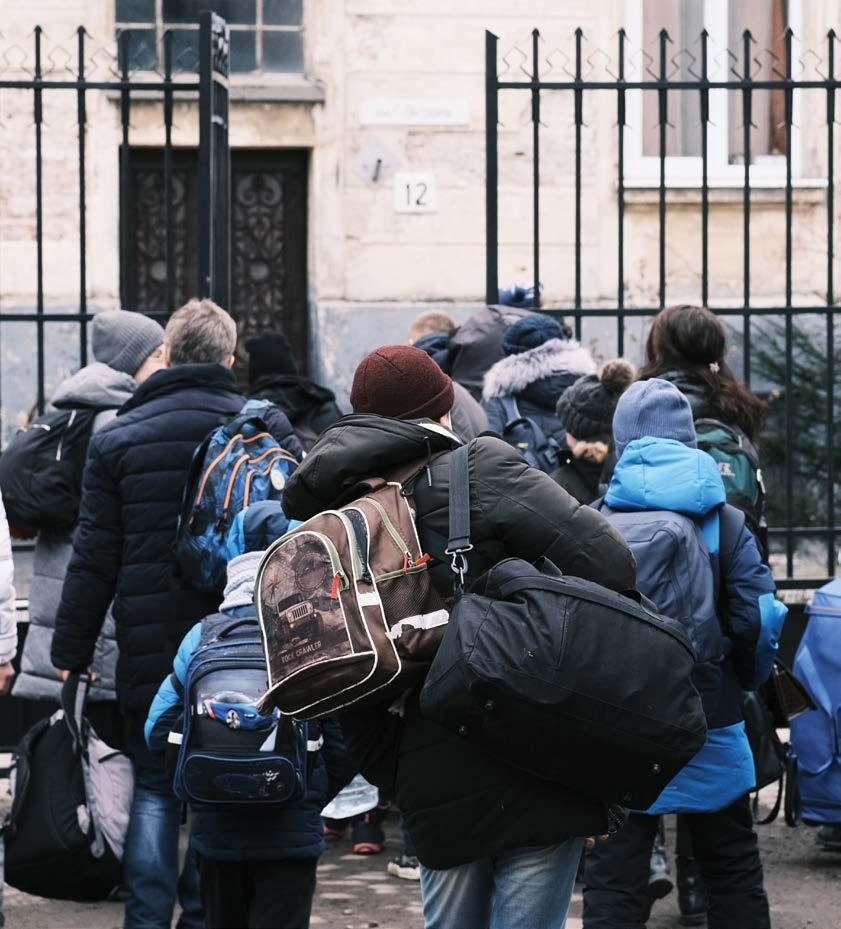

Building Bridges During War
Ministry among the rank and file Alumnus Chap. (Maj.) Brandon Denning equips the next generation of Army chaplains.
The essay
Southwestern Seminary's second president writes about eternal rewards.
ISSUE 03
Vol. 79 2022

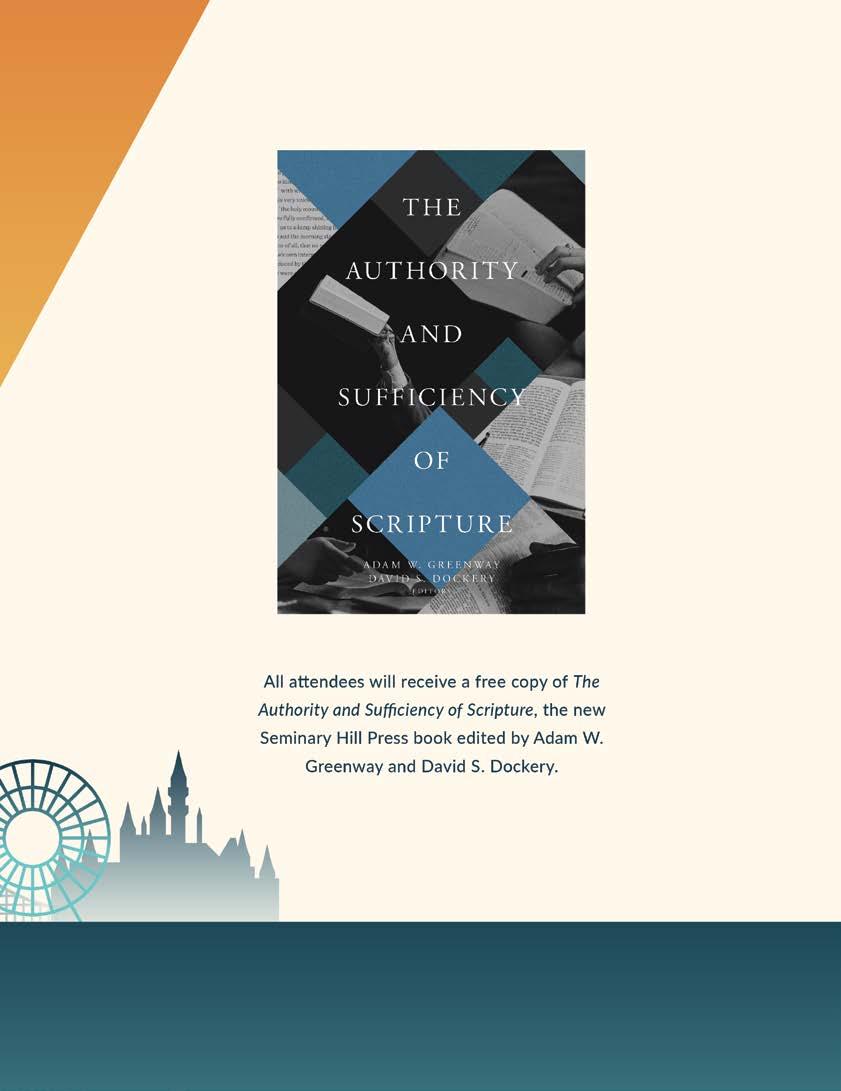
Featured Stories
26-33
FORT WORTH, TEXAS
PROGRAMAS EDUCATIVOS HISPANOS ALACANZAN CON EL EVANGELIO A TEXAS Y A LAS NACIONES
POR ASHLEY ALLEN Y CLARA MOLINA
HISPANIC PROGRAMS ADVANCE GOSPEL IN TEXAS AND TO THE NATIONS
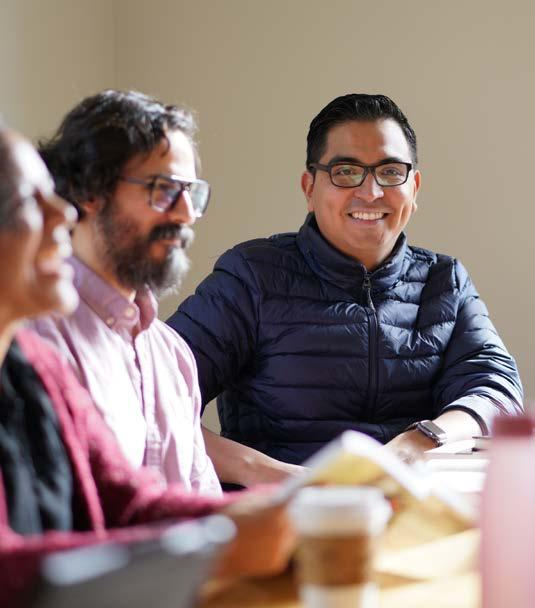 BY ASHLEY ALLEN AND CLARA MOLINA
BY ASHLEY ALLEN AND CLARA MOLINA

52-5 5
THE ESSAY
‘Heavenly Compensations’ Southwestern Seminary's second president's words on eternal rewards.
34-39
ABOUT THE COVER
In their ministry to their fellow Ukrainians, under the leadership of President Yaroslav Pyzh (’09, ’12), the Ukrainian Baptist Theological Seminary faculty, staff, students, and alumni have been aiding displaced Ukrainians, who are arriving in Lviv with all their possessions in backpacks, suitcases, and other bags. See the feature article on Pyzh on pages 46-51.
40-45 46-51
Ministry Among the Rank and File
Alumnus Chap. (Maj.) Brandon Denning (’08) equips the next generation of Army chaplains.
Evangelism on Purpose
Joshua Crisp (’16) intentionally equips his church to share the Gospel.
Resolved: Building Bridges During War
Yaroslav Pyzh (’09, ’12) leads the Ukrainian Baptist Theological Seminary to be ambassadors for the Gospel amid war.
Southwestern News
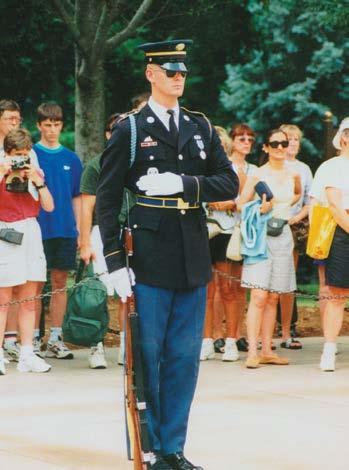
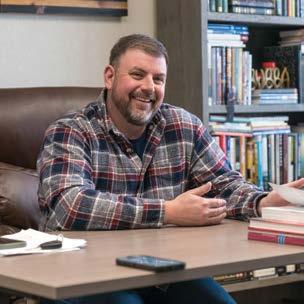
SPRING 2022 Departments Connection Books and resources out now from the SWBTS faculty, including the latest volume in the Seminary Hill Press Legacy Series. SWBTS IN REVIEW 56-57 News and updates from the classes of Southwesterners. AROUND THE WORLD 60-61 The Southwestern story of Charles
includes five decades of investment in the seminary. WHY I GIVE 62-63
Wolcott
NEWS 09-17
Seminary Hill a marquee place to study and live. PEOPLE 19-21
Skaug named
provost, trustees approve budget, first Ministry Now Conference held, and more.
Snapshots of the donors, alumni, students, and faculty members who make
HOW-TO 23-25 34
Professors from
Southwestern Seminary offer expert advice on how to get parents involved with their teenage children and how to be pro-life everyday.
46 40
“... it’s actually opened them to listen
to
the Gospel.”
Spring 2022, Volume 79, Issue 03 swbts.edu/news
PUBLISHER
Adam W. Greenway
EDITOR-IN-CHIEF
Colby T. Adams
EXECUTIVE EDITOR
James A. Smith Sr.
MANAGING EDITOR
Ashley Allen
SENIOR EDITOR
Adam Covington
CREATIVE DIRECTOR
Emil Handke
GRAPHIC DESIGNERS
Caitlyn Jameson, lead
Savannah Cheatham
PHOTOGRAPHER & VIDEOGRAPHER
Chinsop Chong
Mark Ducommun
ONLINE CONTENT
Dawton Marques
Jaclyn Parrish
Rebekah Hodges
1.800.SWBTS.01 swbts.edu
All content © 2022 The Southwestern Baptist Theological Seminary. All rights reserved.
To comment on articles in Southwestern News or to suggest story ideas, write to communications@swbts.edu.
Southwestern News (ISSN 0038-4917) is published three times a year by the SWBTS Office of Communications 2001 W. Seminary Drive Fort Worth, TX 76115 817.921.8729
To subscribe or make mailing address changes, go to swbts.edu/magazine or write to the address below.
Issued three times per year. Postmaster: Please send address changes to Southwestern News P.O. Box 22500 Fort Worth, TX 76122
Stay Connected: swbts.edu @SWBTS SWBTS
SOUTHWESTERNSEMINARY
Give to Southwestern Seminary: swbts.edu/give
Southwestern News
GREENWAY
Why cooperate? A New Testament model
friends were united in their desire to see this paralyzed man healed. Had one or more of them decided that another method of healing would have been better or easier, the mission would have failed. Yet, we see how cooperation resulted in a changed life for one man and impacted the crowds surrounding Jesus as they witnessed firsthand that transformation. Is that not precisely what the Gospel compels us to do as well?
EDUCATIONAL COOPERATION
Jerusalem was suffering due to a famine in that region, and Paul devised a way by which the churches could help them. He called on many of these churches to set aside funds so that, as he passed through and visited them, he could collect the financial aid and deliver it to Jerusalem. He wrote about this collection in several places (1 Corinthians 16:1-4; 2 Corinthians 8-9; and Romans 15:25-28).
WHY COOPERATE? At first glance, the question itself might seem rather trivial. Cooperation unifies. It accomplishes more than individual effort. It overcomes isolationist tendencies. Within a local congregation, cooperation between believers to live out the Great Commission and Great Commandment usually causes little strife. Yet, when the question is applied to many churches, the answer often becomes muddier.
The Baptist Faith and Message’s Article XIV asserts, “Members of New Testament churches should cooperate with one another in carrying forward the missionary, educational, and benevolent ministries for the extension of Christ’s Kingdom. Christian unity in the New Testament sense is spiritual harmony and voluntary cooperation for common ends by various groups of Christ’s people.” How does the New Testament describe cooperation?
MISSIONAL COOPERATION
Mark 2 records a familiar story of cooperative effort that sets a tone about what it means to bring people to Jesus. We find Jesus in a home, and news about Him – particularly concerning His healing ministry – is spreading rapidly. Four men brought a paralytic friend because they knew Jesus was in the healing business and they had love and compassion for their friend. If they could simply get this man to Jesus, something life-changing could occur in his life. This labor of love is missional cooperation in action.
Although this is not an example of churches working together, we see a powerful example of why cooperation matters. These
In the Great Commission, Jesus calls His disciples not only to “go and make disciples of all nations,” but also to “teach them to obey everything I have commanded.” That task was not merely given to the original eleven hearers but has been entrusted to faithful ones gathered into New Testament churches down through time. True churches are the driving force of discipleship in the world: organized fellowships of scripturally baptized believers called together in covenant with one another to help one another understand the Scriptures so that all of them can grow in Christlikeness.
Paul planted the first church in Galatia during his second missionary journey, but it would not take long for another group to come in behind him and alter the Gospel message he had proclaimed. Galatians 1:1-2 shows that he wrote to them not only as individuals, but also as part of a group about whose well-being Paul was deeply concerned. The theological correction needed in that church was a cooperative interest.
When churches operate in isolation, the tendency for erroneous teaching to arise and remain unchecked increases significantly. Paul’s continual efforts to keep up with the churches he planted – to know their health, to encourage them in their successes, and to correct them in their shortcomings – show how cooperation beyond one congregation can serve to rebut error. This same Pauline effort can be evidenced in almost every New Testament letter he penned, and today’s cooperative efforts of churches should mirror that same desire.
BENEVOLENT COOPERATION
In Acts 20:22, Paul insisted that he must go on to Jerusalem. Why? His direct statement is that the Holy Spirit was leading him there; however, there was also a cooperative work he had been organizing. The church in

While the churches in Macedonia were impoverished, they insisted that Paul allow them to contribute as well. The benefit of benevolent cooperation, according to New Testament teaching, is not merely for the specific church in need. By the power of cooperation, every church, including those in poor areas without means to make large contributions, can share in the dignity and joy of being part of something greater for Kingdom advancement. In this way, we ensure that the whole body of Christ flourishes, and we have a chance to show a lost and dying world what the sacrificial love of Jesus tangibly looks like.
CONCLUSION
“Why cooperate?” The simplest answer is that the New Testament models cooperation. Carrying out the Great Commission and the Great Commandment in fullness calls for churches to cooperate with one another so that they might reach more people, teach more people, and help more people than any one church could alone.
By cooperating, Southern Baptist churches support nearly 4,000 international missionaries taking the Gospel around the world. Together, Southern Baptist churches financially sustain six seminaries that are training the ministers who will lead those same churches in faithfulness and fidelity into the next generation. Together, Southern Baptist churches support benevolence ministries like Send Relief, which does more than any group other than the Red Cross to alleviate human suffering.
The real question in light of these truths might be why would we not cooperate to carry forward the commission of Christ?
ADAM W. GREENWAY President
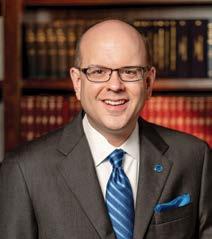
SPRING 2022 5
FROM THE DESK OF ADAM W.
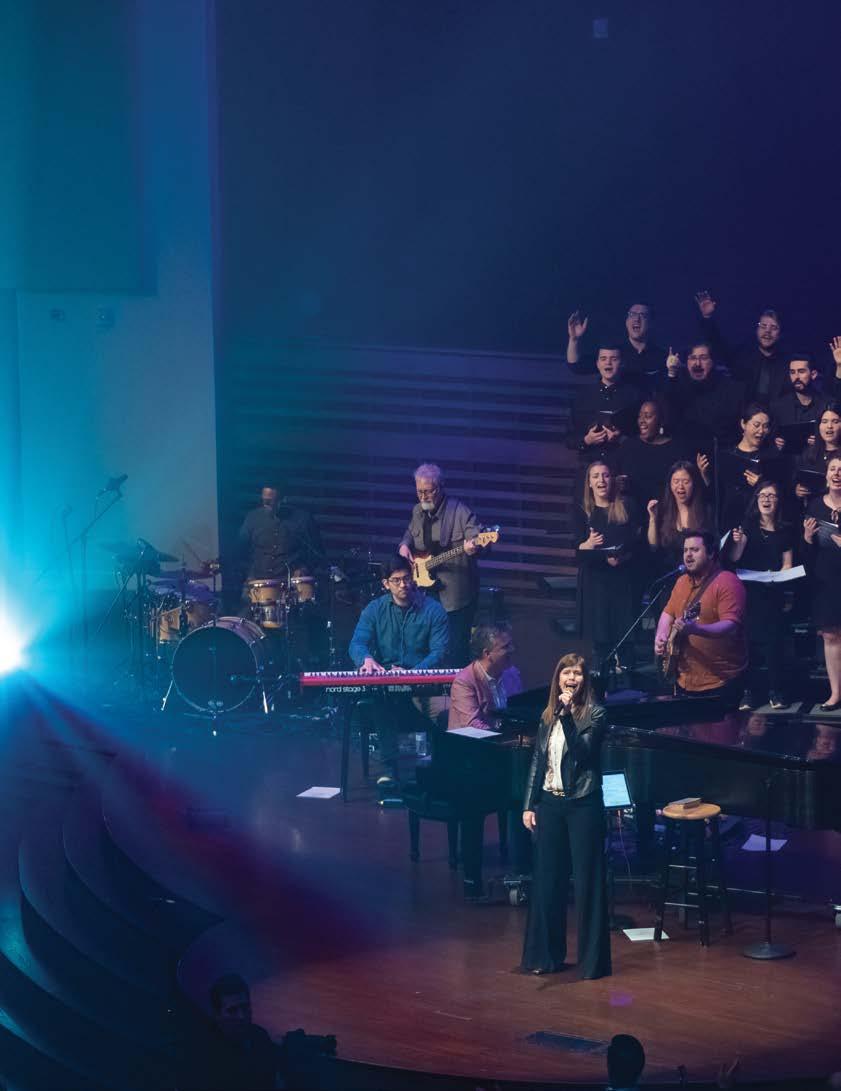
Southwestern News 6
DURING THE MARCH 22-24 MINISTRY NOW CONFERENCE IN MACGORMAN CHAPEL, pastors, church leaders, and Southwestern Seminary students were led in worship by internationally recognized hymn writers Keith and Kristyn Getty and the Southwestern Singers. See more on pages 14-15.
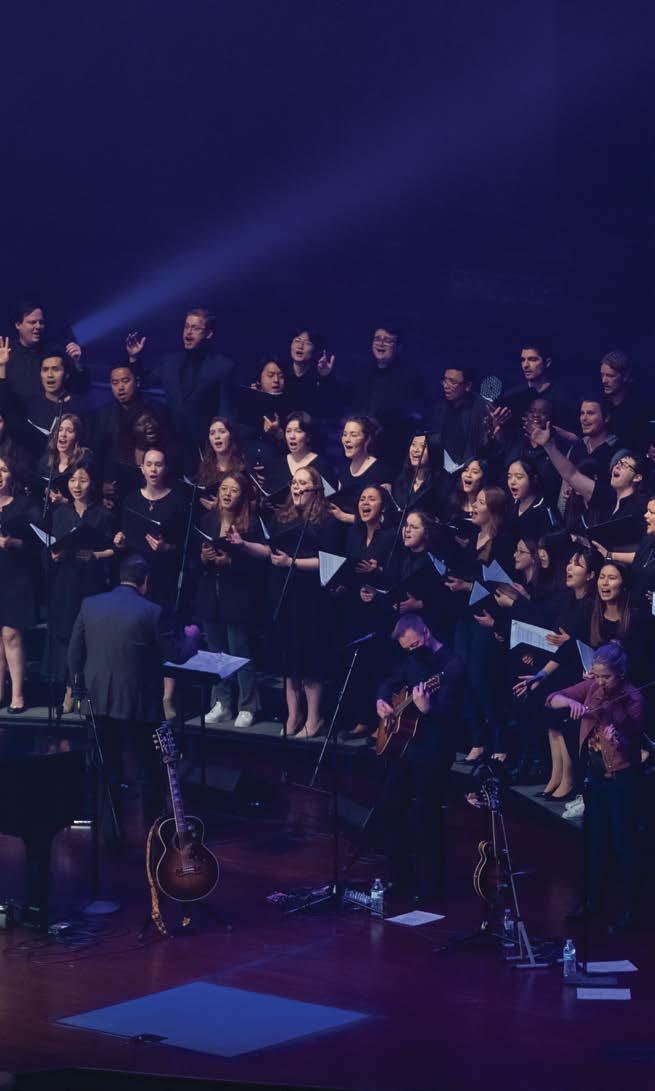
7
FIRST LOOK SPRING 2022
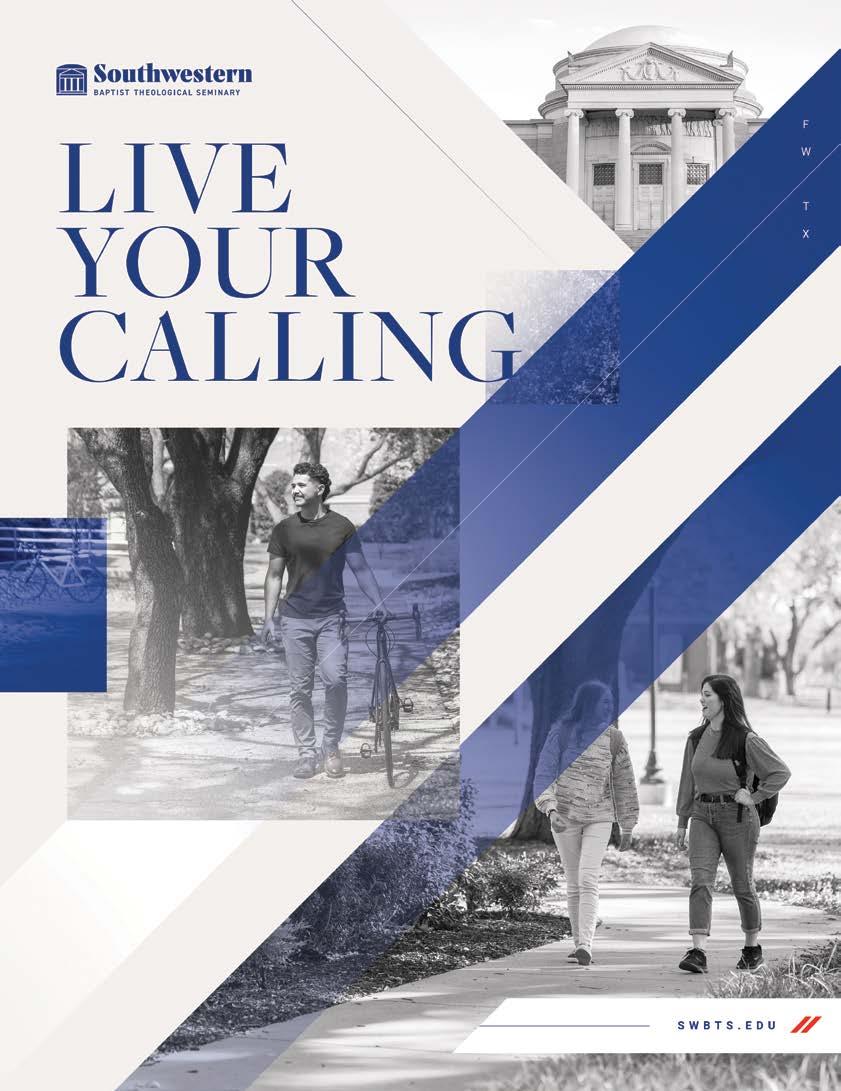
Skaug, Adams elected to new roles during Southwestern Seminary special board meeting
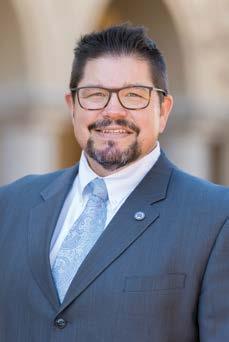
Bates, Carter appointed to TBC leadership roles
BENJAMIN M. SKAUG AND COLBY T. ADAMS WERE ELECTED TO NEW ROLES in the senior leadership of Southwestern Baptist Theological Seminary during a special meeting of the Board of Trustees, Feb. 15.
Meeting via video conference, trustees unanimously elected Skaug as provost and vice president for academic administration and Adams as vice president for institutional administration. Skaug previously served as dean of Texas Baptist College (TBC), while Adams was vice president for strategic initiatives and chief of staff.
Following the trustee meeting, President Adam W. Greenway (’02) appointed M. Todd Bates, dean, and Micah D. Carter, associate dean, of TBC, filling vacancies created by Skaug’s election.
Both elections and appointments were effective immediately.
Concerning Skaug’s election, Greenway said, “After many months of prayer and seek-
ing counsel from both inside and outside our seminary, I became convinced that the person God had prepared for the role of chief academic officer of this institution was already in our midst. In more than a year as dean of Texas Baptist College, Dr. Skaug has proven himself to be a highly effective academic administrator. As a pastor, theologian, and leader he is the right person to take on the immense responsibility of leading our institution’s academic administration. He has my utmost confidence, and I’m grateful for the affirmation of our Board of Trustees.”
Skaug, who came to Southwestern Seminary in 2021, previously served as vice president for institutional advancement at Gateway Seminary and director of development at Southern Baptist Theological Seminary. He has pastored churches in California, Colorado, and South Carolina.
He earned his Doctor of Philosophy degree from Gateway Seminary, holds the Doctor of
Ministry and Master of Divinity degrees from Southern Seminary, and earned an undergraduate degree from the College of Idaho. He is the author of Why Would a Loving God Send Anyone to Hell.
Concerning the election of Adams, Greenway said, “When I came to Southwestern Seminary nearly three years ago, Colby Adams was the first person I appointed to serve on my senior leadership team. Since that time, his extraordinary leadership has demonstrated he is ready for this expanded role. The institution is blessed to have Mr. Adams guiding the Institutional Administration Division.”
In his new role, Adams will continue to oversee communications, campus technology, and events management while assuming oversight of finance and human resources to create the new Institutional Administration Division. Responsibilities that were previously assigned to the vice president for business administration have been divided between the vice president for institutional advancement and the vice president for institutional administration.
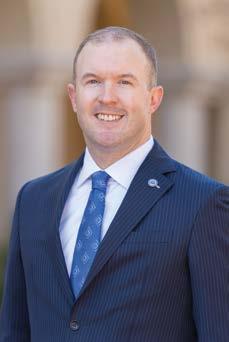
Greenway’s appointment of Bates as new TBC dean fills the vacancy created by Skaug’s election as provost, and his appointment of Carter as TBC associate dean fills the role previously held by Bates.
“Todd Bates and Micah Carter are the right leaders to take Texas Baptist College to the next level of academic excellence with Christian conviction,” Greenway said. “They are both tremendous scholars and committed churchmen, combining the traits we desire our faculty to model to our students. The future is bright for undergraduate education on Seminary Hill.”
Bates, who has served as professor of philosophy since 2021, earned his Doctor of Philosophy at the University of Texas at Arlington, Master of Divinity at Beeson Divinity School, and Bachelor of Arts at the University of Central Florida. He has pastored churches in Alabama, Florida, and Texas, and his academic experience includes roles at Criswell College, Patrick Henry College, California Baptist University, and Houston Baptist University, where he served as dean of the School of Christian Thought.
Carter, who also serves as assistant professor of theology, earned his Doctor of Philosophy and Master of Divinity from Southern Seminary and Bachelor of Arts from Blue Mountain College.—J.A.S.
SPRING 2022 9 SPRING 2022 NEWS Southwestern News
Southwestern Seminary trustees approve budget, elect faculty, honor Dockery during spring meeting
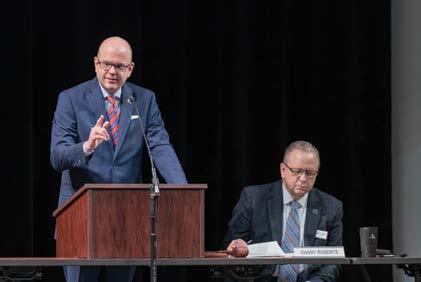
THE SOUTHWESTERN BAPTIST THEOLOGICAL SEMINARY BOARD OF TRUSTEES approved the 2023 fiscal year budget, heard reports of increased giving through the institution’s advancement efforts, elected a new faculty member to the School of Church Music and Worship, named two faculty members to hold endowed academic chairs, and approved the renaming of an academic center in honor of David S. Dockery, during its April 4-5 spring meeting.
“It is my joy to report to the board of trustees that the state of Southwestern Seminary is strong, and it is growing stronger every day by God’s grace,” Adam W. Greenway (’02), president of Southwestern Seminary and Texas Baptist College, said in his report to the board during the April 5 plenary session.
The board approved the proposed fiscal year 2023 budget of $37.367 million, representing a 5.86 percent increase more than the current year. The budget includes a three percent cost-of-living increase for faculty and full-time staff, a three percent increase in tuition and fees, as well as targeted investments in Hispanic Programs, technology infrastructure, and other campus improvements, Greenway said.
Trustees heard reports of “robust blessings” to the seminary’s various advancement efforts for fiscal year 2021, with $17.4 million raised. Not counting funds resulting from the Harold E. Riley Foundation settlement, more than $8.5 million was received, which has already been surpassed in fiscal year 2022 with nearly $10 million received through April 4. The seminary’s fiscal year ends July 31.
Joshua A. Waggener was elected professor of church music and worship, effective Aug. 1, 2022. He has served on the faculty of Southeastern Baptist Theological Sem-
inary since 2008 and earned the Doctor of Philosophy from Durham University in the United Kingdom.
Two current faculty members were named to hold endowed chairs that have achieved full funding status in recent months: Chris Shirley (’94, ’02), associate dean of the Jack D. Terry School of Educational Ministries, to the Jack D. and Barbara Terry Chair of Religious Education in the Terry School, and John D. Massey (’00), dean of the Roy J. Fish School of Evangelism and Missions, to the Charles F. Stanley Chair for the Advancement of Global Christianity in the Fish School. The Terry Chair and Stanley Chair are the first endowed chairs to be fully funded at the level of $2 million. Both chair designations are effective immediately.
Greenway also announced the appointment of J. Stephen Yuille as professor of pastoral theology and spiritual formation in the School of Theology, effective July 1. He currently serves as vice president of academics and academic dean at Heritage College and Seminary in Cambridge, Ontario, Canada, as well as associate professor of biblical spirituality at Southern Baptist Theological Seminary. Yuille earned the Doctor of Philosophy degree from London School of Theology.
Trustees approved the naming of the Center for Global Evangelical Theology in honor of David S. Dockery (’81), distinguished professor of theology and former interim provost of the seminary. During the Evangelical Theological Society meeting in November, Greenway announced the previously “dormant” Center for Theological Research would be rebranded and relaunched.
Trustees also received announcements of other appointments and reassignments of several current faculty, effective June 1, 2022:
• Tanya Karyagina, assistant professor of piano in the School of Church Music and Worship;
• Coleman M. Ford, assistant professor of humanities in Texas Baptist College; and
• Justin Wainscott, assistant professor of pastoral ministry in the School of Theology and director of Professional Doctoral Studies.
The board approved the promotion of Charles Carpenter (’10) from associate professor to professor of humanities in Texas Baptist College. Sabbatical leaves were granted to W. Madison Grace II (’06, ’12), associate professor of theology in the School of Theology, and Joshua Williams, associate professor of Old Testament in the School of Theology, for Aug. 1, 2022-July 31, 2023, and for Deron J. Biles (’92, ’97), professor of preaching and pastoral ministry in the School of Theology, for Aug. 1-Jan. 31, 2023.
Trustees reelected their current slate of officers: as chairman, Danny Roberts (’74), executive pastor of North Richland Hills Baptist Church, North Richland Hills, Texas; as vice chairman, Jonathan Richard (’14), senior pastor of First Baptist Church, Estancia, New Mexico; and as secretary, Jamie Green, retired speech-language pathologist in Katy, Texas.
All recommendations to the board were approved by unanimous votes.
In his concluding remarks, Greenway expressed appreciation for the service of outgoing board members, J. Kie Bowman (’85, ’90), Texas; Jeff Crook, Georgia; Connie Hancock, Ohio; and Don Whorton, an at-large member. —Staff
Southwestern News 10 NEWS
Southwestern Seminary welcomes new faculty and staff to campus

Seminary announces three academic and four administrative leadership appointments.
PRESIDENT ADAM W. GREENWAY (’02) announced in January and February his appointment of three new faculty members who will teach courses at Texas Baptist College and the School of Theology and four individuals were appointed to administrative leadership roles in the areas of Institutional Advancement, Institutional Administration, and the Office of the President.
FELIX CABRERA
ASSOCIATE DIRECTOR OF HISPANIC PROGRAMS AND ASSISTANT PROFESSOR OF CHRISTIAN MINISTRY, TEXAS BAPTIST COLLEGE

Cabrera, who will remain in his role as the senior director of Send Español of the North American Mission Board, will serve Southwestern Seminary by assisting in building the Hispanic Programs, including developing new undergraduate degrees.

MICAH D. CARTER
ASSOCIATE DEAN AND ASSISTANT PROFESSOR
OF THEOLOGY, TEXAS BAPTIST COLLEGE
Carter most recently served as the senior pastor of First Baptist Church of Ripley, Mississippi. He earned his Doctor of Philosophy in systematic theology at Southern Baptist Theological Seminary in 2008. Prior to serving at FBC Ripley, Carter served six years at Lifeway Christian Resources.
JUAN R. SÁNCHEZ
ASSOCIATE PROFESSOR OF THEOLOGY

Sánchez has been appointed associate professor of theology in the School of Theology. Sánchez earned Master of Divinity (1999), Master of Theology (2002), and Doctor of Philosophy (2015) degrees from Southern Seminary and holds a Bachelor of Music in music education from the University of Florida (1994).


MICHELE G. SMITH
ASSOCIATE VICE PRESIDENT FOR FINANCE
Smith previously served as the vice president of business and finance at Brite Divinity School of Texas Christian University. She holds Bachelor of Business Administration and Master of Business Administration degrees, both with concentrations in finance, from Baylor University. She also serves as the volunteer treasurer for Mercy Clinic of Fort Worth.
ERIC H. VAUGHAN
ASSOCIATE VICE PRESIDENT FOR OPERATIONS
Vaughan most recently served eight years as the executive director of Compassion Center of Northwest Arkansas. He earned his B.A. in telecommunications from Oklahoma Baptist University and an M.A. in theology and leadership from Liberty Baptist Theological Seminary.
STEVEN GRAVES
DIRECTOR OF FACILITIES MAINTENANCE
Graves previously served on church staffs in Kentucky, Georgia, and Arkansas, and most recently worked as the core claims project manager for a restoration company in Norcross, Georgia. He earned a Bachelor of Arts degree from Spurgeon College in 2019.
D. HEATH WOOLMAN
CHIEF OF STAFF, OFFICE OF THE PRESIDENT
Woolman most recently served as the discipleship pastor at First Baptist Church, Kissimmee, Florida. He is currently a Doctor of Education in organizational leadership candidate in the Jack D. Terry School of Educational Ministries at Southwestern Seminary.
—A.A.

SPRING 2022 11 NEWS
CARTER
SMITH
VAUGHAN
GRAVES
WOOLMAN
NEW ACADEMIC AND ADMINISTRATIVE STAFF
B.H. Carroll, though ‘being dead still speaks’ to SBC issues today, Hawkins says during Founder’s Day address
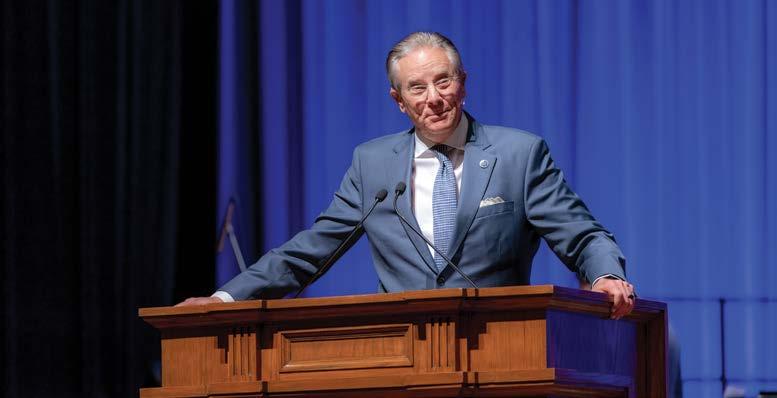
THOUGH NOW GONE FOR MORE THAN 107 YEARS, THE FOUNDER OF SOUTHWESTERN BAPTIST THEOLOGICAL SEMINARY, B.H. Carroll, “still speaks” today to the issues that face Southern Baptists, O.S. Hawkins (’74, ’21) said in an address delivered March 10 as part of Founder’s Day, marking the 114th anniversary of the seminary.
“As Southwesterners, we have a rich heritage, but to find the real strength of this institution we must journey back to the roots, back to the life and legacy of our founder on this Founder’s Day,” said Hawkins, president emeritus of GuideStone Financial Resources and former pastor of First Baptist Church of Dallas, Texas. Carroll’s courage, conviction, consistency, and cooperation are applicable to modern-day Baptist debates on the Bible, confessions of faith, women in ministry, and denominational cooperation, Hawkins contended.
In his introduction of Hawkins, Adam W. Greenway (’02), president of Southwestern Seminary and Texas Baptist College, said he is thankful for Hawkins’ “legacy of leader-
ship” noting “there is nobody more fitting to deliver the 2022 Founder’s Day address here at Southwestern Seminary in the historic Truett pulpit in the historic Truett Auditorium than a successor to Truett in Dr. O.S. Hawkins.” The auditorium is named in honor of George W. Truett, who served as pastor of First Baptist Dallas, 1897-1944, and was a longtime trustee and board chair of the seminary.
The gathering was the first seminary chapel service in more than a decade to be held in Truett Auditorium in the B.H. Carroll Memorial Building. Founder’s Day is a special chapel service held annually on the date closest to the anniversary of the seminary’s chartering, March 14, 1908.
Greenway announced that the pulpit being used for the first time in Truett Auditorium is believed to be the same one from which Truett preached his first official sermon in 1890 at the First Baptist Church of Sherman, Texas. The pulpit was recently donated by the church to Southwestern Seminary and will normally be on display at the B.H. Carroll Center for Baptist Heritage and Mission.
“It has never been more important not only to understand our founder’s vision but to continue to respect and implement it in preparing another generation for Gospel ministry,” Hawkins said.
“Southwestern’s growth across these many decades can be reflected in its unique ability to stay faithful to its founder’s vision,” Hawkins observed. “We serve a complicated and complex Southern Baptist Convention today. In many ways it is fragmenting before our eyes, currently caught in the conflict of several significant issues.”
These “heightened markers of concern and debate in SBC life today,” involve the Bible, confessions of faith, women in ministry, and cooperation, Hawkins said. He noted that Carroll left “hundreds of pages of commentary and writings which speak specifically to these matters.”
Hawkins observed “like righteous Abel, ‘He being dead, still speaks,’” referencing Hebrews 11:4. —K.B.
Southwestern News 12 NEWS
DURING THE DEC. 3 COMMENCEMENT CEREMONY AT SOUTHWESTERN BAPTIST THEOLOGICAL SEMINARY AND TEXAS BAPTIST COLLEGE (TBC), President Adam W. Greenway (’02) challenged more than 300 graduates to speak a “word of comfort to Christ’s people” and “cry out” to the lost who need the Gospel.
“My prayer is that you will be a people who are known as those who comfort and those who cry out,” Greenway exhorted from Isaiah 40. “That this Isaianic ministry may be a ministry model for you, wherever you may serve.”
The fall 2021 certificate, bachelors, masters, and doctoral graduates included men and women from Southwestern Seminary’s four graduate schools and TBC, who represent 33 states and 20 countries, including the United States. Three degrees were awarded posthumously to Alan Wayne Meadows, Michael Rodriguez, and Sterling Sellman, who passed away during the semester. Family representatives received the diplomas on their loved one’s behalf.
In his commencement sermon, Greenway
Greenway cautions students to guard their hearts during studies
STUDENTS PURSUING THEOLOGICAL EDUCATION MUST CAREFULLY GUARD THEIR HEARTS AGAINST PRIDE AND BEING UNLOVING, President Adam W. Greenway (’02) preached during a Jan. 25 convocation message officially opening the spring semester at Southwestern Baptist Theological Seminary and Texas Baptist College.
said through the prophet Isaiah, the Lord gives “a word of exhortation and a word of commission and challenge” while reminding them of the Fort Worth seminary they represent.
speak two words as you go?”
Greenway encouraged the graduates to speak a word of “comfort to Christ’s people” as God told Isaiah to “comfort My people” in
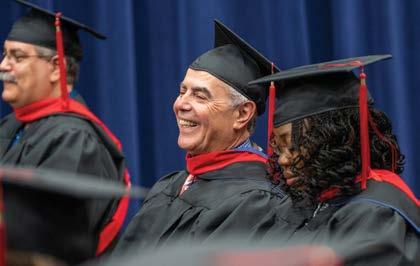
“To most people in the watching world, you are Southwestern Seminary to them,” Greenway exhorted the graduates. “What they know and believe about the efficacy of Southwestern Seminary is what they will see and hear and observe in and through you. And so may I challenge you, my fellow Southwesterners, to
the midst of their experiences of adversity, brought on by “their own sin.”
Greenway also challenged the graduates to “cry out to a watching world” as the remainder of the Isaiah 40 passage shows God is “the One who is worthy to be proclaimed and preached to all peoples everywhere.” —A. A.
During the service, three faculty members elected by the Board of Trustees in October 2021 publicly signed the seminary’s Book of Confessional Heritage, and two newly appointed faculty members were introduced.
In the first chapel service of the new academic semester, Greenway acknowledged some students were just beginning their scholarly pursuits while others were nearing the completion of their studies. However, he said he was “mindful” of the tendencies that could occur at any stage in theological education if believers are “not guarded.”
While affirming the “importance and centrality” of theology, as well as academic and intellectual pursuits, Greenway warned about the “temptation” that certain methods of aca-
demic pursuits are “not virtuous” and “can impact or affect you in terms of your personality type, your disposition, your wiring in ways that may even seem unconscious, perhaps.”
Greenway preached from Ephesians 1:1519, but also read verses 3-14 of chapter one in which the Apostle Paul writes about the spiritual blessings of salvation “in Christ.”
“There’s a way to read those verses and think, ‘Aren’t I something?’” Greenway said. “If we always put the accent mark on the ‘me’ rather than the ‘He,’ our theology is always going to go astray.”
However, Greenway added, “We can never truly understand and see ourselves rightly if we don't understand truly and see God rightly.” —A. A.
NEWS
Comfort God's people, cry out to the lost, Greenway implores December graduates
13
“My prayer is that you will be a people who are known as those who comfort and those who cry out.”
SPRING 2022
- GREENWAY (’02)
Southwestern Seminary hosts first Ministry Now Conference
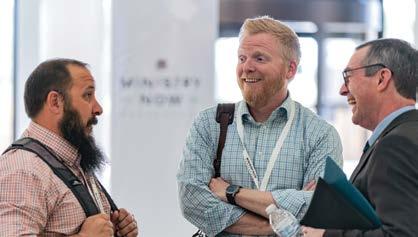
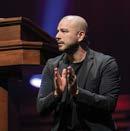
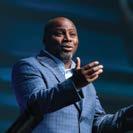
SOUTHWESTERN BAPTIST THEOLOGICAL SEMINARY AND TEXAS BAPTIST COLLEGE (TBC) HOSTED ITS FIRST MINISTRY NOW CONFERENCE
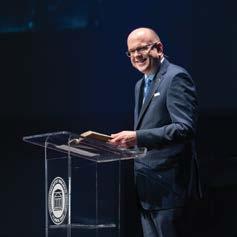
March 22-24, featuring eight plenary session speakers who spoke to the role and health of the church amid a changing cultural context. Two micro-session speakers offered practical ideas for church ministry, while conference participants were also equipped through 27 breakout sessions led by seminary and college faculty and others who provided tools for pastors and ministry leaders.
The conference allowed participants to “look at and talk about ministry now and ministry moving forward in an incredibly changing, complex, complicated world that desperately needs the hope found only in Jesus Christ,” said Adam W. Greenway (’02), president of Southwestern Seminary and TBC, in his welcome to conference attendees.
Worship was led by Keith and Kristyn Getty, internationally recognized hymn writers, and Matt Boswell, hymn writer and founding pastor of The Trails Church in Celina, Texas. Southwestern Singers, Cowden Hall Band, and the TBC Band also joined the musical guests in leading worship. Keith Getty and Boswell also met with students in the School of Church Music and Worship to talk about worship leadership and ministry. —A. A.
“When did we lose, as a people, the desire to want to believe the best about those in our own tribe? And when did we succumb to the idea that we glorify God the most when we find every reason to label, to disparage, and to build walls?”
“The Gospel still works. Don’t try to fabricate it. Don’t try to change it. Don’t try to flip it up. Don’t do nothing."
Southwestern News 14 NEWS NEWS 14
“The most difficult heart you will ever have to shepherd is your own because you will be tempted to disobey God in order to get affirmation from man.”
Adam W. Greenway (’02), president, Southwestern Baptist Theological Seminary and Texas Baptist College
Marcus D. Hayes (’17), lead pastor, Crossroads Baptist Church, The Woodlands, Texas
Noe Garcia, senior pastor, North Phoenix Baptist Church, Phoenix, Arizona
“A healthy church is built on the Word of God that it might look like the Son of God for the glory of God. This is God’s purpose for us.”

“At the heart of biblical preaching is... men who have seen great things in the Bible, savor what they have seen, and then they stand before other people sharing what they saw. Have you savored God’s Word? If you don’t savor it, it won’t spread.”
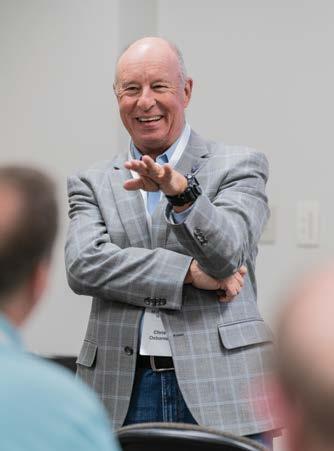
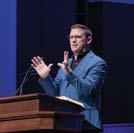
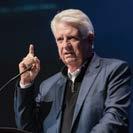
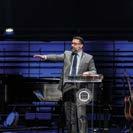
“There is no room for laziness in the ministry. There’s no room for coasting for the Christian because God has called us.”
“We as believers need to be running into our cities with the hope of the Gospel and the care that comes with loving Christ and loving our neighbor.”
“If there’s ever been a time in our lives where our people’s faith needs to rest not on man’s wisdom, but the power of God, it’s right now.”
SPRING 2022 15 NEWS
Donna Gaines, founder, ARISE2Read, Memphis, Tennessee
Jack Graham (’76, ’80), senior pastor, Prestonwood Baptist Church, Plano, Texas
Juan Sánchez, pastor, High Pointe Baptist Church, Austin, Texas, and associate professor of theology
Matt Carter (’06), lead pastor, Sagemont Church, Houston, Texas
Michael Criner (’07, ’16), senior pastor, Rock Hill Baptist Church, Brownsboro, Texas
Southwestern Seminary announces
Terry Chair elevated to $2 million funding level after $1 million gift
SOUTHWESTERN BAPTIST THEOLOGICAL SEMINARY NOW HAS ITS SECOND $2 MILLION ENDOWED CHAIR, President Adam W. Greenway (’02) announced in December after receiving an anonymous $1 million gift to complete the funding of the Jack D. and Barbara Terry Chair of Religious Education.
While the Terry Chair is the second academic chair to be fully funded at the current funding level, it is the first fully-funded chair of the Jack D. Terry School of Educational Ministries.
“I am delighted that in the Lord’s providence we are now able to see the establishment of the second fully-funded endowed chair at Southwestern Seminary at the $2 million funding level,” said Greenway. “I am further gratified that this particular chair honors one of Southwestern Seminary’s choice servants, Dr. Jack Terry, and his wife, Barbara, recognizing their decades of faithful service to our seminary. We are indebted to the anonymous donors who have made possible this gift that will ensure teaching in the fields of educational ministries at Southwestern Seminary in perpetuity.”
Established in 2007, the Terry Chair is named for Jack D. Terry Jr. (’62, ’67), former dean and long-time faculty member of the Jack D. Terry School of Educational Ministries, and his wife of more than 60 years, Barbara. The School of Educational Ministries was named in his honor in 2009.—A.A.

Naylor awarded 2022 Pro Ecclesia Medal of Service
REBEKAH A. NAYLOR, DISTINGUISHED
PROFESSOR OF MISSIONS AND MISSIONARY-IN-RESIDENCE AT SOUTHWESTERN SEMINARY, was awarded the 2022 Pro Ecclessia Medal of Service from Baylor University at a ceremony on the Waco campus in February. The award is presented to a Baylor alumnus whose broad contributions to Christian ministry have made an immeasurable impact.
“I am quite humbled by this honor from Baylor,” said Naylor, daughter of Robert E. Naylor, Southwestern Seminary's fifth president. “My service was in obedience to God’s call and all that took place was by the hand of the Lord. This award gives me opportunity to give glory and praise to God.”
Naylor, a 1964 Baylor graduate who also earned her Doctor of Medicine
from Vanderbilt University Medical School in 1968, served as an International Mission Board medical missionary in India for over 30 years. Naylor served at Bangalore Baptist Hospital (BBH) from 1974-2002, during which time the hospital experienced significant growth. While her initial appointment was as a clinical surgeon, she eventually assumed the positions of chief of medical staff, administrator, and medical superintendent. Under her supervision, BBH expanded patient care services and increased its capacity from 80 to 160 beds. In 2011, Naylor helped begin Mercy Clinic, a healthcare clinic on the campus of Travis Avenue Baptist Church in Fort Worth, that provides uninsured adults with healthcare and dental services.—A. A.
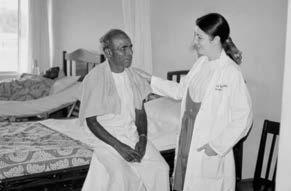

Southwestern News 16 NEWS
Global Missions Week challenges students to see lostness, need for Gospel witnesss in South Asia
highest concentration of lost people worldwide but also has the highest concentration of Muslims in the world. Students also heard of opportunities and ways they could serve in short- and long-term missions capacities.
Ian Buntain, director of the WMC and associate professor of missions in the Roy J. Fish School of Evangelism and Missions, said the purpose of Global Missions Week is to help educate students of the need for the Gospel, while simultaneously encouraging them to consider a call to missions.
IT IS “IMPORTANT NOT TO NEGLECT THE REALITY OF THE LOSTNESS,” Lilly* said during Global Missions Week at Southwestern Baptist Theological Seminary and Texas Baptist College held Feb. 28-March 4.
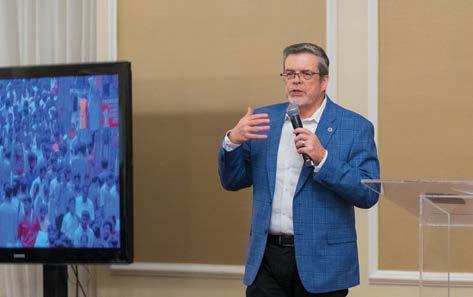
Lilly and her husband, Alex,* who are Southwestern Seminary graduates and International Mission Board (IMB) missionaries, were part of the South Asian mission team
Students
LEARNING TO COMMUNICATE THE GOSPEL WITHIN A MUSLIM CONTEXT is what a group of eight Southwestern Seminary and Texas Baptist College (TBC) students experienced through a March 9-19 mission trip to the North Africa and Middle East (NAME) region of the world.
Led by Justin Hiester (’16), assistant professor of missions at TBC, the team served alongside International Mission Board missionaries to share the Gospel within the 10/40 window, the region of the world with the larg-
who interacted with students through events hosted by the World Mission Center (WMC) at Southwestern Seminary.
Through sharing testimonies in classes, question and answer sessions, and fellowship meals, Southwestern Seminary and TBC students learned more about reaching the 1.6 billion lost people in the countries of the region. Missionaries shared the region is not only the
“We long to challenge our students to live for something that is worth dying for–and to be engaged in the only Christian activity that will not be done better in heaven,” Buntain said. “We not only want to expose them to the reality of global Gospel poverty, but we want to introduce them to men and women who were once exactly where they now are, and who are now serving the name of Jesus overseas, to the praise of His glory. And we pray that as they interact with our missionaries each day, that the Lord would lend them the courage to imagine themselves in their shoes.”—A. A.
*Names changed for security reasons.
est number of unreached people groups and the fewest number of Christian workers.
Gabby*, a Master of Divinity student from Nevada, said a “series of God-ordained interactions” allowed her to make connections with women from the region.
“We connected on false assumptions that the world and TV portrays on both sides,” Gabby said. “These conversations meant the most because they helped me realize that although we are different, we still go through many of the same fears, experiences, and
obstacles in life.”
Bradley*, a TBC student from Texas, said was reminded of the need for people to go as missionaries overseas.
“It may appear that we send many people around the world to make God's name known, but the truth is, we are lacking in the cities and nations that need the Gospel the most,” Bradley said. —A.A.
*Names changed for security reasons.
SPRING 2022 17
NEWS
engage Muslims with Gospel during Spring Break mission trip
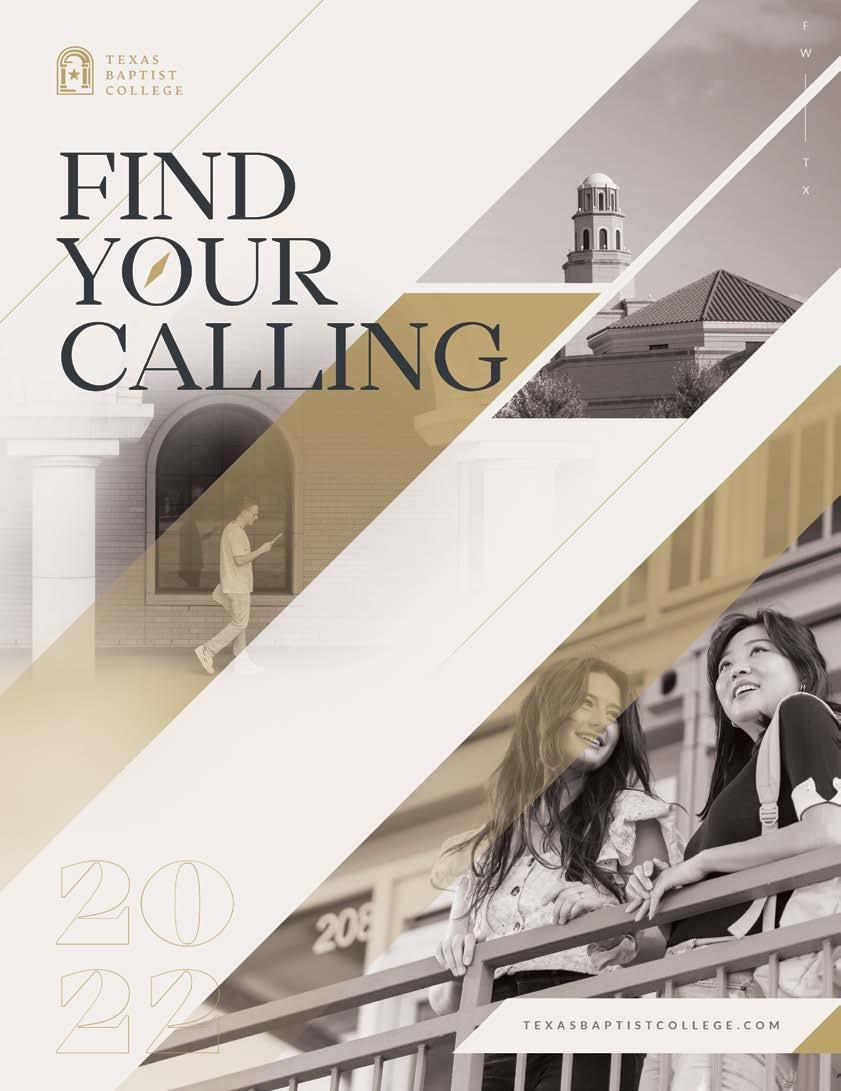
Jordan Edwards
Current B.A. in Christian Studies student Texas Baptist College
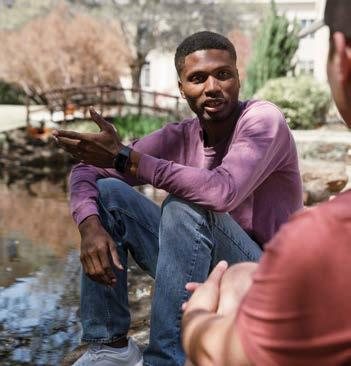
“I’M FROM THE SMALL TOWN of Gladewater located in the best part of Texas (East Texas). I’m pursuing a degree in Christian Studies. I chose Southwestern after seeing how much the professors here cared about the learning, and spiritual development of the students. After I had visited two other institutes I prayed and listened to God, then a couple weeks later I decided that Southwestern is the best place for me to get a Biblical Christian education. My favorite things about Southwestern are the many friendships, connections, and leadership roles that I have been able to be a part of. A lot of these friendships that I’ve made are going to encourage me life-long, as I get to see many of them courageously go off into a variety of different ministries to help further God’s Kingdom.”
“NOWHERE ELSE WOULD I WANT TO BE than SWBTS! Having lived most of my life in Texas, I resonate with the Great Commission vision of Southern Baptists in this part of the country. Now in my second stint teaching here and as a two-time grad, I also share a deep love of the school with thousands of other Southwesterners. Having been a street evangelist, church planter, and pastor, I pray the Lord uses me to impart to my students a biblical vision of being the best thinkers and apologists possible in their specific callings.”
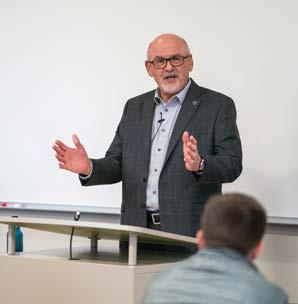
SPRING 2022 19 PEOPLE
Southwestern Seminary exists to train people for the work of ministry. And it’s the people who make Seminary Hill a special place. It’s easy to see why.
1 /2/3/4/5/6/7/8
TED J. CABAL
1/ 2 /3/4/5/6/7/8
STUDENT
Professor of Philosophy of Religion; Master of Divinity 1990; Ph.D. 1995
JoAn Hale
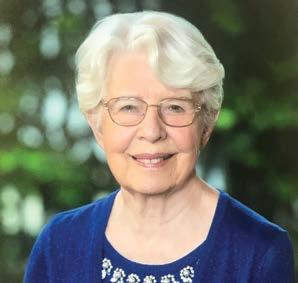
JOAN HALE AND her late husband, Clifton, began giving to Southwestern Seminary in 1996 after their only child, a 24-year-old son, passed away. After living in parts of the United States that needed Gospel proclamation, the Hales began giving to Revive this Nation, formerly known as Spring Practicum. Revive this Nation is a week that allows Southwestern Seminary students to preach the Gospel in areas across the country during Spring Break.
“We love the Lord. We decided after a lot of prayer–a lot of prayer–that we were going to give our money to Southwestern, whatever there is left. We wanted to serve the Lord–we still do.”
Beverly Parrish Skinner
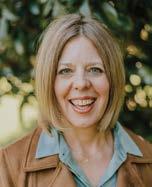
“CHOOSING SOUTHWESTERN FOR MY THEOLOGICAL EDUCATION was one of the best and most life-changing decisions for me! As a Texas Baptist, Southwestern was the school with which I was most familiar, but I also chose it because I knew I would be well prepared for a lifetime of service in collegiate ministry. In addition to gaining a world-class theological education, I also gained friendships
JUSTIN WAINSCOTT Assistant Professor of Pastoral Ministries and Director of Professional Doctoral Studies
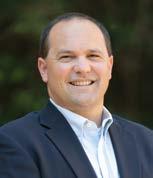
“I LOVE GETTING TO KNOW students and investing in them. I am looking forward to friendships and fellowship with faculty and staff. I love teaching God’s Word, helping students understand it, and apply it.”
with professors and colleagues which have continued through the nearly 25 years since I graduated. Nearly every day of ministry, I call on a theological truth I learned from a professor or an encouragement I received from a classmate. God continues to bear much good fruit in my life from the years I spent at Southwestern!”
Southwestern News 20
Director of Campus Expansion, Georgia Baptist Mission Board; Master of Divinity, 1998
Donor
1/2/3/4/ 5 /6/7/8 1/2/ 3 /4/5/6/7/8 PEOPLE
DONOR 1/2/3/ 4 /5/6/7/8
ALUM
“We love the Lord. We decided after a lot of prayer–a lot of prayer–that we were going to give our money to Southwestern, whatever there is left.”
DANNY SOUDER
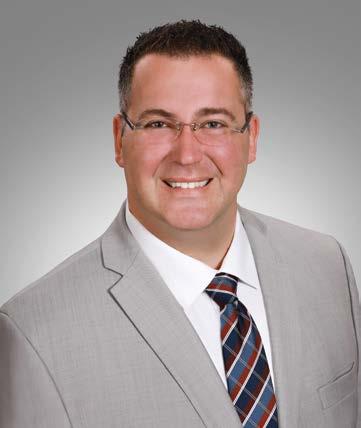
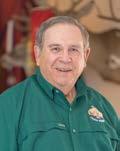
Donor; Master of Divinity, 1976
ALUM
1/2/3/4/5/ 6 /7/8
Associate Pastor of Evangelism and Discipleship at Shady Grove Baptist Church, North Richland Hills, Texas; Master of Divinity, 2011; Th.M., 2015; Ph.D., 2020
“I CHOSE TO STUDY AT SWBTS because I am a Texan and because I love the seminary’s emphasis on soul-winning.
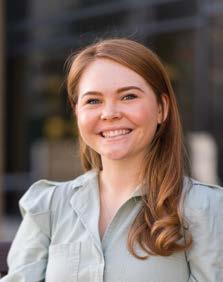
L.R. Scarborough’s writings and works have been an enormous influence on my life as an evangelist. I believe SWBTS to be the bedrock of evangelism in theological education. Southwestern’s faculty is second to none. These are not only professors but lifelong friends and prayer partners. I am grateful for the professors, like the late Roy Fish, Tony Maalouf, and Brent Ray, who poured into my life. I am blessed by the on-going mentorship of Matt Queen. Being a Southwesterner means you are a part of a family.”
SARA GAW
Master of Arts in Christian Education student
“I CHOSE SOUTHWESTERN because the Lord called me to seminary after college. My family recommended that I check out its degree programs online. I saw the variety of programs offered and specifically the opportunities for women in ministry. After praying and seeking wise counsel in my life, I knew that Southwestern was the right choice. I have thoroughly enjoyed my time here thus far. Some of my favorite things about Southwestern include
the beautiful campus, the community of fellow students, and the professors. The community aspect creates an enjoyable environment for learning and has sharpened my thinking and beliefs in many ways. I also love how the professors and faculty at Southwestern genuinely care about the men and women being equipped for ministry and their spiritual health. All the elements that I enjoy about Southwestern have enriched my experience at the seminary.”
SPRING 2022 21
PEOPLE
“I’M AN ALUMNUS OF SOUTHWESTERN. I graduated from there and had great experiences and training and I have a love for Southwestern. I believe in the training of people going into ministry who are going to do evangelism and discipleship and equipping and leadership trainings. I believe that Southwestern is the best seminary to do that. I believe in the mission and the purpose of Southwestern and I want to see more students trained to do evangelism, discipleship, and pastoral and missions ministry.” 1/2/3/4/5/6/ 7 /8 1/2/3/4/5/6/7/ 8
DONOR
Beau Keith Brewer
STUDENT
“I am grateful for the professors, like the late Roy Fish, Tony Maalouf, and Brent Ray, who poured into my life. I am blessed by the on-going mentorship of Matt Queen. Being a Southwesterner means you are a part of a family.”
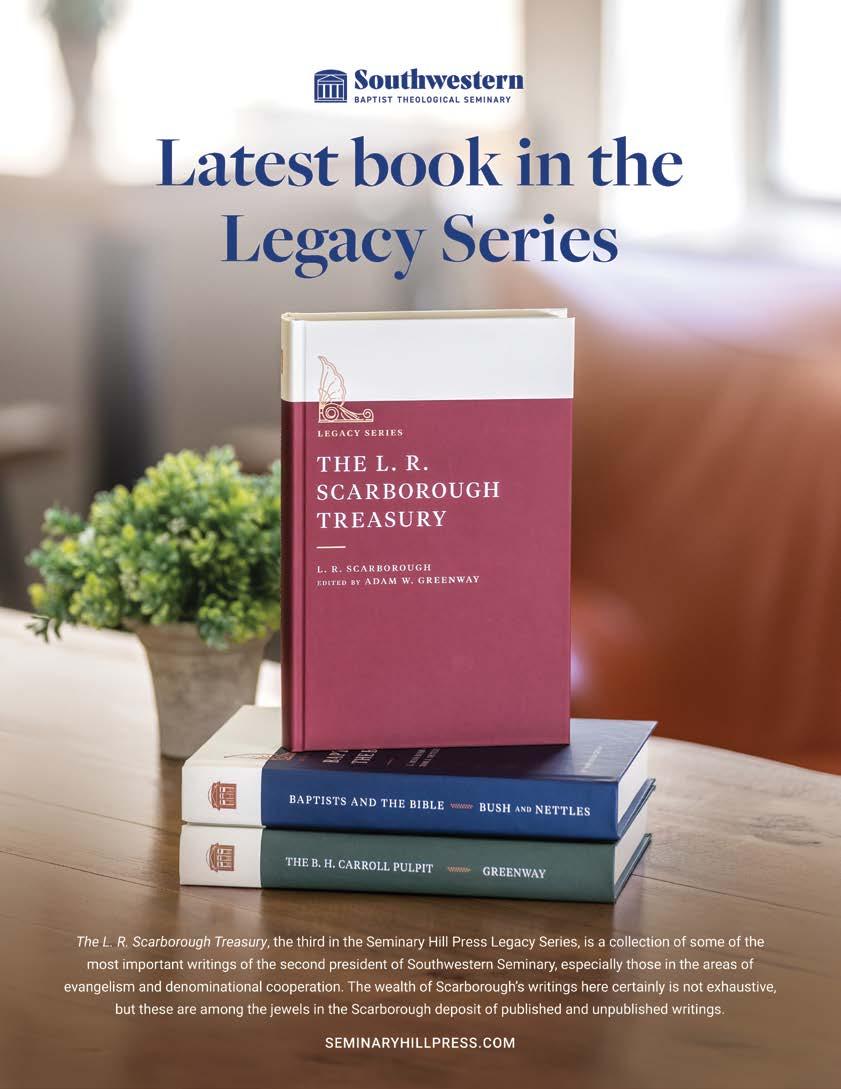
How to Get Parents Involved with Their Teenage Children

AFTER HIGH SCHOOL GRADUATION, ABOUT HALF OF YOUTH GROUP MEMBERS WALK AWAY FROM THE CHURCH, about forty percent become adult pew sitters who make little difference for the kingdom, and about ten percent follow Christ as disciples who impact the kingdom.
Age-group ministry with teenagers matters, and it does contribute to lifetime faith. But moving parents into spiritual leadership with their children is an even more powerful way to develop future adults who will impact the kingdom all their lives.
Lead parents to restore their “first love” in Jesus. Trying to change the behavior and practices of parents without changing their hearts is a dead-end street. Leading parents with cold hearts to rediscover their first love in Jesus must precede any other initiative. Many parents have drifted so far from Christ that they almost need to meet Him all over again.
The good news is that parents with newly-awakened hearts will want to become spiritually important to their children and begin new practices in their homes. They will want their faces to glow and their eyes to sparkle when they speak of Jesus at home.
Call parents with restored hearts to choose a new “best” for their children. Shallow parents consider the happiness and success of their children to be the best. They want to see their children excel in athletics, academics, or the arts now to achieve financial prosperity as adults. On the other hand, parents with awakened hearts
place the highest value on seeing children joining King Jesus in bringing His kingdom on earth for the glory of God.
Call parents to lead at home spiritually. Vague challenges to parents are not adequate. Church leaders need to be specific in calling parents to take steps in new directions. For example, leaders might challenge parents to 1. Speak of Jesus with your children at least once a day, 2. Pray with your family once a day, beyond saying grace, and 3. Read the Bible as a family once a week.
Demonstrate to parents how to spiritually lead at home. The majority of church parents today did not grow up with parents who spiritually led at home. Wise church leaders demonstrate to parents what they are challenging them to do at home.
When parents alive in Christ become intentional about spiritually leading at home, we will see many more young adults walk in faith for a lifetime

SPRING 2022
HOW-TO
RICHARD ROSS (’74, ’80) serves as senior professor of student ministry at Southwestern Seminary.
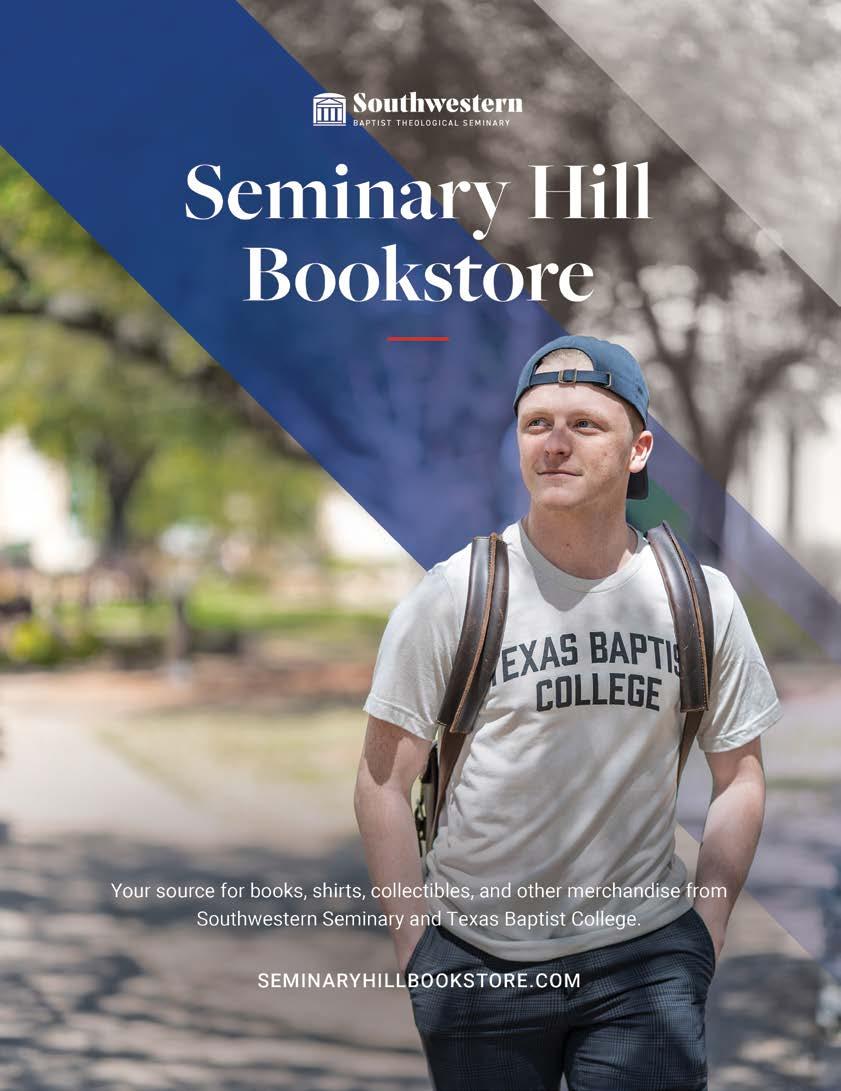
How to be Pro-life

Every Day
THE SANCTITY OF HUMAN LIFE IS A FOUNDATIONAL PRINCIPLE IN SCRIPTURE, FROM GENESIS TO REVELATION. Humans are created in the image of God and have worth, regardless of utility or disability or vulnerability (Genesis 1:26; Psalm 139). The people of God are called to stand up and speak out for the vulnerable in our midst (Micah 6:8). So how can we do that in practical ways in our communities? Here are four ways to be pro-life every day:
1. Actively support the work of your local church in meeting pro-life needs in the community. It’s likely that your church supports a local pregnancy care center, helping young women in crisis make decisions about an unplanned pregnancy. Delivering Gospel hope, these centers care for both the woman and her child. You can help by donating money, time, and other resources to ensure these ministries can continue to do the work God has called them to do.
2. Model human dignity in the way you speak up for the vulnerable. It’s not only important to speak up for the unborn in our communities through our words and actions, but it is also important that we consider the way we speak about this issue. James 3:8 says that our tongues can either be instruments of life or instruments of death. As we talk about this issue, we must remember that those who disagree are people made in God’s image. While we should make strong, forceful arguments for the sanctity of life, we should make them in ways that recognize the dignity of those we are trying to persuade.
3. Consistently apply your pro-life ethic to other areas of human dignity. It is good and right to stand up for the unborn and to champion laws that recognize their humanity. And yet we should also take our pro-life ethic into consideration when we think about issues like poverty, immigration, and other weighty matters. This doesn’t mean we agree with every prescription to solve these issues nor does it mean Christians can’t disagree on finding the most prudent policy, but we should at least have a sensitivity and desire to help the real people who suffer in our communities.
4. Use your vote and your voice to champion laws that recognize the dignity of the unborn. Politics isn’t ultimate and we should always let our faith shape the way we engage in the public square. Still, in a representative republic like ours where citizens have a voice in shaping the laws that govern us, we should not shy away from making our voices heard and carefully considering whom we vote for. Laws that protect the unborn should not be the totality of our pro-life witness, but they are important in acknowledging what we know to be true: humans, from conception to natural death, are image-bearers of the Almighty.

SPRING 2022 25
HOW-TO
DANIEL M. DARLING is director of the Land Center for Cultural Engagement and assistant professor of faith and culture at Texas Baptist College.
Programas educativos hispanos alcanzan con el Evangelio a Texas y a las naciones
POR ASHLEY ALLEN Y CLARA MOLINA
Hispanic Programs advance Gospel in Texas and to the nations
 BY ASHLEY ALLEN AND CLARA MOLINA
BY ASHLEY ALLEN AND CLARA MOLINA
Southwestern News 26
1/8
Cuando Fernando Mangieri, nativo de Argentina, se inscribió como estudiante en la Maestría en Estudios Teológicos (Master of Theological Studies, MET) en los Programas Hispanos del seminario Southwestern, lo hizo motivado por el “deseo de seguir creciendo y aprendiendo” y de ser “más eficiente” como pastor asociado en la Iglesia Bautista Prestonwood en Español en Plano, Texas.
El enfoque del ministerio de Mangieri “es conectar a cada persona con Cristo y la iglesia” Prestonwood en Español, una de las congregaciones hispanas más grandes de la Convención Bautista del Sur con más de 2,200 miembros. Su educación teológica en un seminario “reconocido mundialmente” le ha permitido evaluar los esfuerzos misioneros de la iglesia, planificar mejor para el futuro e identificar áreas que “necesitan mejoras o cambios de estrategia”.
Mangieri es uno de los más de 500 estudiantes que están participando actualmente en los programas hispanos del seminario Southwestern. Lanzado en 2012, los cursos de educación teológica en español se ofrecen a estudiantes de los Estados Unidos, casi todos los 21 países de América Latina, el Caribe, Canadá y varios países de Europa.
Actualmente, hay aproximadamente 3500 iglesias Bautistas del
Sur hispanoparlantes en los Estados Unidos. Julio Arriola (2020), exlíder hispano del Comité Ejecutivo de la SBC y recientemente nombrado director de Send Texas para la Junta de Misiones Norteamericanas, dice que casi el 40 por ciento de las iglesias están ubicadas dentro del estado de Texas. “Con casi 1,300 iglesias en español ubicadas dentro de los límites de este estado, la necesidad de una educación teológica basada en la Biblia, teológicamente sólida y disponible en español es crítica”, dice Arriola.
En febrero de 2019, cuando Adam W. Greenway ('02) fue elegido presidente del Seminario Southwestern, una parte integral de su visión para el futuro de la institución fue el crecimiento de la educación teológica hispana.
John D. Massey ('94, '00), decano de la Escuela de Evangelismo y Misiones “Roy J. Fish”, que alberga los Programas Hispanos en Southwestern Seminary, dice que la visión es brindar la educación teológica más integral y sólida a los hispanos en los Estados Unidos y en América Latina, y también, equipar y educar a los líderes de las iglesias hispanas y latinoamericanas para que ellos puedan evangelizar sus comunidades y países, mientras llevan el Evangelio a las naciones.
When Argentine-native Fernando Mangieri enrolled as a Maestría en Estudios Teologicós (Master of Theological Studies, MET) student in the Hispanic Programs at Southwestern Seminary, it was because of a “desire to continue growing and learning” and to be “more efficient” in his role as the associate pastor at Prestonwood Baptist Church en Español in Plano, Texas.

Mangieri’s ministry focus “is to connect every person with Christ and the church” at Prestonwood en Español, one of the largest Hispanic congregations in the Southern Baptist Convention with more than 2,200 members. His theological education at a “globally recognized” seminary has enabled him to assess the church’s missions efforts and better plan for the future while also identifying areas that “need improvement or a change in strategy.”
Mangieri is one of over 500 students currently enrolled in Southwestern Seminary’s Hispanic Programs. Launched in 2012, theological education courses in the Spanish language are offered to students from across the United States, almost all the 21 countries in Latin America, the Caribbean, Canada, and several countries in Europe.
Currently, there are approximately 3,500 Spanish-language Southern Baptist churches in the United States. Julio Arriola (’20), former
Hispanic leader of the SBC Executive Committee and recently named Send Texas director for the North American Mission Board, says nearly 40 percent of the churches are located within the state of Texas. “With almost 1,300 Spanish-language churches located within the borders of the Lone Star State, the need for theological education that is biblically based, theologically sound, and available in Spanish is critical,” Arriola says.
In February 2019 when Adam W. Greenway (’02) was elected president of Southwestern Seminary, an integral part of his vision for the future of the institution was the growth of Hispanic theological education.
John D. Massey (’94, ’00), dean of the Roy J. Fish School of Evangelism and Missions, which houses the Hispanic Programs at Southwestern Seminary, says the vision is to provide the most comprehensive and strongest theological education to Hispanics and Latin America, as well as equip and educate Hispanic and Latin American church leaders to evangelize their communities and countries while also advancing the Gospel to the nations.
“We are at the epicenter of the evangelical Hispanic church movement in Texas,” Massey says. “We view it as a stewardship from the
SPRING 2022 27
2/8
“Estamos en el epicentro del movimiento de la iglesia hispana evangélica en Texas”, dice Massey. “Vemos este movimiento como una encomienda del Señor que nos lleva a estar a la vanguardia y a equipar a los líderes de las iglesias hispanas con la capacitación y las herramientas que necesitan para iniciar nuevas iglesias, fortalecer las congregaciones que ya existen y llevar el Evangelio hasta los confines de la tierra.”
Esta visión del programa fue un “factor convincente” para que Mark McClellan ('83, '00) al aceptar ser el director del programa hispano en la primavera de 2021. “Considero que la ubicación, la oportunidad y el legado de Southwestern son las razones más ideales para
la educación teológica hispana en los Bautistas del Sur”, explicó.
McClellan sirvió como plantador de iglesias y evangelista en Guatemala por medio de la Junta de Misiones Internacionales durante más de una década. Según el hacia discípulos y entrenaba a los líderes de las iglesias, muchos de ellos buscaban educación teológica en los Estados Unidos. Aunque McClellan tenía varios títulos, incluyendo una Maestría en Divinidades de Southwestern, al igual que un título en Derecho, el deseo de los líderes de la iglesia guatemalteca de continuar su educación impulsó a McClellan a continuar su educación teológica.
El completar su Doctorado en Filosofía en 2000 en Southwestern, su deseo fue, “involucrase en la educación y preparación teológica de los hispanos.”
A través de funciones docentes y administrativas en otros seminarios y universidades, además de servir en la Convención Bautista General de Oklahoma, McClellan pudo ayudar a ser uno de los pioneros en la educación teológica hispana, mientras acoplaba su experiencia ministerial y su preparación teológica. Estas experiencias le han permitido formar y avanzar el programa de Southwestern y manteniendo una vista al futuro.
“Cuando llegué aquí, vi la oportunidad de expandir los programas de capac-
Lord to be at the forefront of equipping Hispanic church leaders with the training and tools they need to start new churches, strengthen existing churches, and take the Gospel to the ends of the earth.”
This vision for the program was a “compelling factor” for Mark McClellan (’83, ’00) in accepting the role as director in the spring of 2021.
“I consider the location, the opportunity, and the heritage of Southwestern to be the most ideal situation for Hispanic theological education in Southern Baptist life,” he explains.
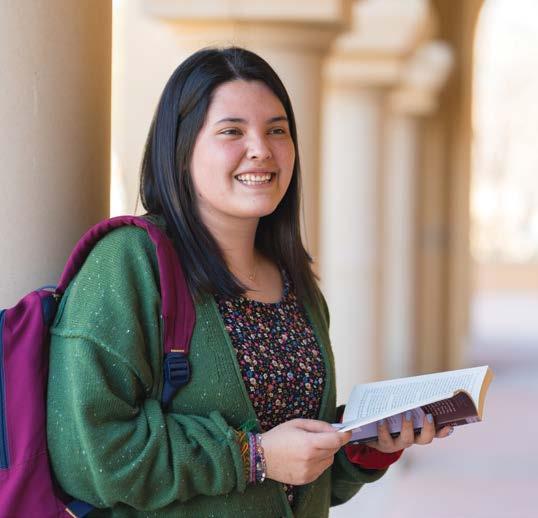
McClellan served as an International Mission Board church planter and evangelist in Guatemala for over a decade. As he was making
disciples and training church leaders, many of those he was training would seek theological education in the United States. Though he held multiple degrees – including a Master of Divinity from Southwestern, as well as a law degree –the Guatemalan church leaders’ desire to further their education encouraged McClellan to further his theological education. He realized, “I’m doing the work of winning them, training them, and planting their churches, and now they are going to go to seminary; maybe I ought to be involved in theological education to take this a step further.”
Upon completion of his Doctor of Philosophy degree in 2000 at Southwestern, his hope was “to become involved in the theological education and preparation of Hispanics.”
Through faculty and administrative roles at other seminaries and colleges, as well as serving with the Baptist General Convention of Oklahoma, McClellan was able to help pioneer Hispanic theological education, as he coupled his field experience and theological education. It has allowed him to know how to shape and advance Southwestern’s program with an eye to the future.
“When I came here, I saw the opportunity for us to expand the Hispanic theological and ministerial training program at every level from
Southwestern News 28
3/8
itación ministerial y teológica hispana en todos los niveles, desde certificado hasta doctorado”, explicó.
El programa hispano fue lanzado en el 2012 con la MET bajo el liderazgo de Daniel Sánchez ('66), distinguido profesor emérito de misiones en la “Fish School.” Sánchez trabajó para reclutar estudiantes, formar asociaciones con iglesias y ayudar a establecer becas para que los estudiantes pudieran asistir las clases.
“El Dr. Sánchez ha sido la fuerza clave que ha trabajado con las iglesias para que estas se asocien con el Seminario para equipar a los líderes hispanos para el ministerio”, dice McClellan. “Estoy agradecido por los tremendos esfuerzos del Dr. Sánchez en el desarrollo de la MET y el reclutamiento de estudiantes desde el inicio del programa. El continúa sirviendo en los programas hispanos y tiene una contribución personal bien estratégica”.
El currículum y la reputación de SWBTS atrajeron a Misael Rodríguez ('21).
Originario de Cuba, Rodríguez pastorea Hillcrest en Español en Cedar Hill, Texas, en las afueras de Dallas. Rodríguez, quien pastoreó dos iglesias en Habana, Cuba, y que anteriormente había enseñado en institutos bíblicos y seminarios en Cuba y los Estados Unidos, dijo
que sus estudios en Southwestern lo ayudaron a prepararse para el ministerio en los Estados Unidos, al mismo tiempo que lo motivaron académicamente.
“Graduarme del programa en español de SWBTS me ayudó a comprender cómo ministrar transculturalmente, ya que hay una comunidad hispana muy diversa para servir en los Estados Unidos”, explica. Estaba “inspirado por los estándares académicos, la capacidad pedagógica, la flexibilidad y el carácter cristiano de los profesores que impartían los cursos.”
Además de la MET, el programa incluye un título de Asociado en Estudios Cristianos, una Licenciatura en Ministerio Pastoral y un Doctorado en Ministerio (DMIN) enfocado en evangelismo y misiones, así como teología pastoral.
“Terminamos de completar la aprobación y acreditación del plan de estudios más amplio y completo para la educación teológica hispana en la Convención Bautista del Sur”, dice McClellan. Se planean más ofertas de títulos, entre los que se incluyen un Certificado en Estudios para mujeres, que comenzará en agosto de 2022. Todos los cursos asociados con cada título se ofrecen en español y todos los cursos, excepto los de nivel doctoral, se ofrecen en línea, haci-
certificate to doctoral,” he explains.
The program was launched in 2012 with the MET under the leadership of Daniel Sánchez (’66), distinguished professor emeritus of missions in the Fish School. Sánchez worked to recruit students, form partnerships with churches, and help establish scholarships so students could take classes.
“Dr. Sánchez has been a force behind churches partnering with the seminary to equip Hispanic leaders for the ministry,” McClellan says. “I am grateful for the tremendous efforts of Dr. Sánchez in the development of the MET, and the recruitment of students since the beginning of the program. He continues to serve in Hispanic Programs and plays a strategic role.”
The curriculum and reputation drew Misael Rodriguez (’21).
Originally from Cuba, Rodriguez pastors Hillcrest en Español in Cedar Hill, Texas, just outside of Dallas. Rodriguez, who pastored two churches in Havana, Cuba, and has previously taught at Bible institutes and seminaries in Cuba and the United States, said his studies at Southwestern helped prepare him for ministry in the U.S., while also motivating him academically.
“Graduating from SWBTS’ Spanish-language program helped
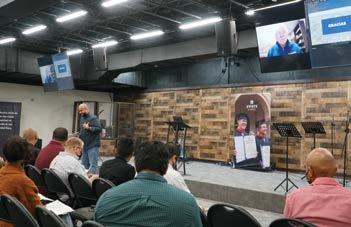
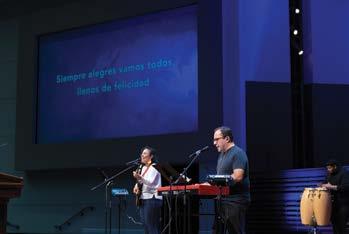
me understand how to minister cross-culturally since there is a very diverse Hispanic community to serve in the United States,” he explains. He was “inspired by the academic standards, pedagogical ability, flexibility, and Christian character of the professors teaching the courses.”
In addition to the MET, the program includes an associate’s degree in Christian studies, a bachelor’s degree in pastoral ministry, and a Doctor of Ministry degree with concentrations in evangelism and missions, as well as pastoral theology.
“We have just completed the approval and accreditation of the broadest, most comprehensive curriculum for Hispanic theological education in the Southern Baptist Convention,” McClellan says. More degree offerings are planned, including a women’s studies certificate that will begin in August 2022. All the courses associated with each degree are offered in Spanish and all the courses, except for those at the doctoral level, are offered online, making the program’s offerings accessible worldwide. Other new degree programs will be added in the near future.
The academic training drew Esteban Bauducco, a current MET student.
SPRING 2022 29
4/8
endo que el programa sea accesible en todo el mundo y próximamente se agregarán otros programas nuevos con nuevos títulos.
La formación académica atrajo a Esteban Bauducco, quien, actualmente, se encuentra cursando la MET.
Originario de Mar del Plata, Argentina, durante los últimos ocho años Bauducco, se ha desempeñado como pastor asociado de adultos en español en Champion Forest Baptist Church en Houston, Texas. La congregación hispanoparlante tiene más de 3,000 miembros.
“Yo quería profundizar mis estudios en una institución académicamente sólida y que me preparara para seguir avanzando en mi ministerio,” y agregó que las clases han impactado positivamente su ministerio.
El programa ubicado en, Fort Worth es “el lugar más ideal en los Estados Unidos para la educación teológica bautista hispana,” dijo McClellan, señalando el gran porcentaje de iglesias bautistas hispanas.
La reputación de quienes se han graduado anteriormente de Southwestern y que han servido como misioneros de la IMB, dice McClellan, señala que el seminario “ha preparado a más misioneros para el servicio de la
Originally from Mar del Plata, Argentina, Bauducco has served as the associate pastor of adults in Spanish at Champion Forest Baptist Church in Houston for the last eight years. The Spanish congregation has over 3,000 members.
“I wanted to deepen my studies in an academically solid institution that would prepare me to continue advancing in my ministry,” he explains, adding the classes have positively impacted his ministry.
The program’s home-base in Fort Worth is “the most ideal spot in the United States for Baptist Hispanic theological education,” McClellan says, noting the large percentage of Hispanic Baptist churches.
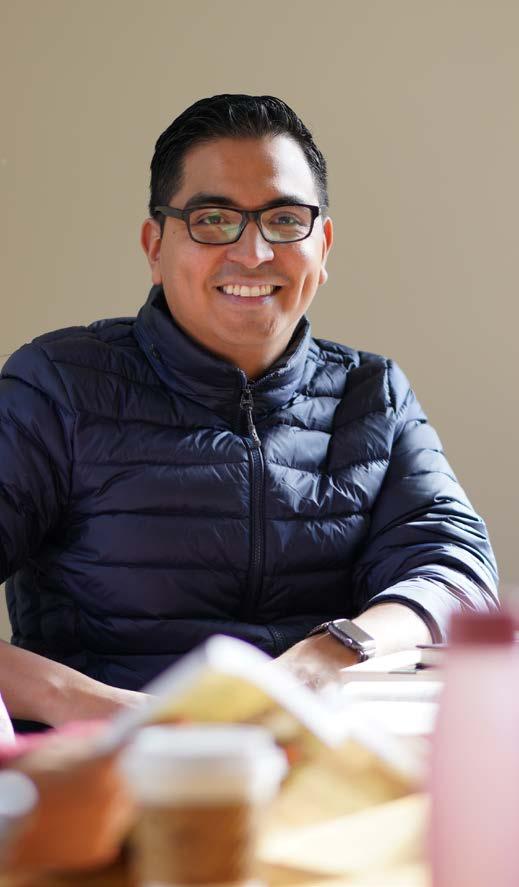
The reputation of Southwestern alumni who have served as IMB missionaries in Latin American countries is also a distinction of the program, McClellan says, noting the seminary “has prepared more missionaries for IMB service than any other seminary. Our heritage of Southern Baptist missionary work in Latin America is still there.”
Students who are enrolled in the program will find the program is “driven by a commitment to evangelism and missionary advance-
Southwestern News 30
5/8
IMB que cualquier otro seminario.
Los estudiantes que están inscritos en el programa encontrarán que el mismo está “impulsado por un compromiso con la evangelización y el avance misionero”, explica McClellan. El liderazgo de los cursos en español desea que los estudiantes “motiven a otros a presentar y expandir el Evangelio” a la vez que desarrollen “convicciones teológicas fuertes y profundas que los sostendrán a lo largo de sus carreras en el ministerio.”
Este compromiso resuena en Esther Constante, estudiante de la MET, nacida en el Ecuador.
Constante y su esposo, Roberto Sigcho ('18, '21), se mudaron a vivir a SWBTS en 2016 para que Sigcho pudiera participar en el programa de Maestría en Educación Cristiana. La pareja sirve en el Seminario Bautista “Piedra Angular” en Mérida, México, una institución que ofrece educación teológica a las iglesias de Yucatán. El llamado de Constante se enfoca en las áreas de evangelismo y discipulado a mujeres.
“He aprendido los fundamentos doctrinales… el uso práctico de esas doctrinas en mi ministerio de evangelización y discipulado”, explica Constante. “Las clases me han ayudado a aclarar las inquietudes de los nuevos creyentes y las mías; además de motivarme a promover el estudio profundo de las Escrituras para no dejarnos llevar por pensamientos e ideologías humanas.”
La educación teológica que Constante está recibiendo ya está teniendo un impacto al ella usar “este conocimiento para enseñar correctamente la Palabra” al discipular a las mujeres que Dios ha puesto en su camino.
McClellan cree que parte de la implementación de la visión del pro-
grama incluye el desarrollo del “plan de estudios más dinámico que una facultad hispana y latinoamericana podría proveer en ningún otra parte.” Esto significa que prepararemos y desarrollaremos nuevos profesores y eruditos.
Félix Cabrera fue nombrado director asociado de los Programas Hispanos en enero del 2022. Cabrera, quien se desempeña como director principal de Send Network Español para la Junta de Misiones Norteamericanas y también pastorea la Iglesia Bautista “Ciudad de Dios” originario de Puerto Rico, ayudará construir el programa y desarrollará nuevos títulos universitarios. Cabrera cree que los programas hispanos en Southwestern serán “el faro para la educación teológica en español debido a su calidad de educación, accesibilidad, flexibilidad, rigor académico, compromiso con el Evangelio y el deseo del seminario de llegar a la creciente población hispana en Texas y en el
ment,” McClellan explains. The program’s leadership desires for the students to be “contagious to present the Gospel, expand the Gospel” while at the same time developing “strong, deep theological convictions that will sustain them throughout a long career in ministry.”
This commitment resonates with Esther Constante, a MET student from Ecuador.
Constante and her husband, Roberto Sigcho (’18, ’21), moved to Seminary Hill in 2016 so Sigcho could work on his Master of Arts in Christian Education. The couple serves at the Piedra Angular Baptist Seminary in Mérida, México, a school that offers theological education to the churches of the Yucatán. Constante’s calling focuses on the dual areas of evangelism and discipleship training of women.
“I have learned the fundamentals of doctrines … the practical use of those doctrines in my ministry of evangelism and discipleship,” Constante explains. The classes have helped her “clarify concerns in new believers, and myself, and promote the deep study of the Scrip-
tures so as not to be carried away by human thoughts and ideologies.”
The theological education Constante is learning is already making an impact as she uses “this knowledge for the correct teaching of the Word” as she disciples the women God has placed in her path.
McClellan believes part of accomplishing the vision for the program includes developing “a curriculum and Hispanic and Latin American faculty that is stronger than anywhere.” This means “preparing and developing new professors and scholars.”
Felix Cabrera was named as the associate director of the Hispanic Programs in January 2022. Cabrera, who also serves as the senior director of Send Network Español for the North American Mission Board and pastors Iglesia Bautista Ciudad de Dios in his native Puerto Rico, will help build the program and develop new undergraduate degrees. Cabrera believes the Hispanic programs at Southwestern will be “the beacon for theological education in Spanish because of its quality of education, accessibility, flexibility, academic rigor, commitment to the Gospel, and the desire of the seminary to reach the growing Hispanic population in Texas and abroad.”
Additionally, Juan Sánchez, who was named to the faculty of the School of Theology at Southwestern in January 2022, will also teach Spanish-language courses in the Hispanic Programs. Sánchez, who pastors High Pointe Baptist Church in Austin, Texas, is also the board chairman of The Gospel Coalition and co-founder and president of Coalición por el Evangelio. He will deliver the convention sermon at the 2022 Southern Baptist Convention in Anaheim, California, the first Latino pastor to do so.
“These are two of the very top Hispanic leaders in Southern Baptist
SPRING 2022 31
“...impulsado por un compromiso con la evangelización y el avance misionero...”
- MARK MCCLELLAN (’83, ’00)
“...driven by a commitment to evangelism and missionary advancement...”
6/8 SPRING 2022
- MARK MCCLELLAN (’83, ’00)
extranjero”.
Adicionalmente, Juan Sánchez, quien fue nombrado miembro de la facultad de la Escuela de Teología de Southwestern en enero del 2022, impartirá cursos en español en los Programas Hispanos. Sánchez es el pastor de la Iglesia Bautista “High Pointe” en Austin, Texas, y es presidente de la junta de The Gospel Coalition; además, es co-cofundador y presidente de “Coalición por el Evangelio.” Él es el primer pastor latino que predicará el sermón convencional en la Convención Bautista del Sur de 2022 en Anaheim, California.
“Estos son dos de los principales líderes hispanos en la vida de los Bautistas del Sur”, dice McClellan, llamando a Cabrera un “visionario, apasionado por la educación teológica” y “una perfecta adición” como director asociado “porque él está en el campo ministerial a nivel nacional, preparando líderes y comprometido a los niveles de la educación teológica del seminario y del colegio.”
“Juan Sánchez es una de las principales mentes teológicas emergentes dentro de los Bautistas del Sur”, dice McClellan. “Él es un ejemplo perfecto de un pastor-teólogo, que es un modelo que realmente nos encantaría que nuestros estudiantes imitaran en Southwestern.”
Darío Bá Xuc es un estudiante que está usando lo que aprendió en Southwestern para impactar a su país natal, Guatemala. Xuc es
life,” McClellan says, calling Cabrera a “visionary” who is “passionate about theological education” and “the perfect addition” as the associate director “because he is in the field nationally, preparing leaders and he is committed to seminary and college levels of theological education.”
“Juan Sánchez is just one of Southern Baptists’ up and coming leading theological minds,” McClellan says. “He is a perfect example of a pastor-theologian, which is a model we would really love for our students to capture at Southwestern.”

Dario Bá Xuc is a student who is using what he has learned at Southwestern to impact his native Guatemala. Xuc is the leader of the K’ekchi’ Baptist Association, an association of more than 300 churches. Xuc, who anticipates graduating with his MET in May 2022, equips and teaches pastors and students at the K’ekchi’ Baptist Biblical Institute in their heart language, while also overseeing 20 missionaries within the association.
He explains his theological training at Southwestern has helped him learn “the great importance of studying and analyzing the Word of God in order to preach and teach God’s Word.” This lesson, coupled with the lessons of sound theology and Baptist doctrine, has enabled him to teach “these doctrines to the pastors and students in the K’ekchi’ language.”
Southwestern News 32
“El evangelismo y el alcance misionero mundial han sido cosas que Southwestern ha hecho bien y fielmente durante más de un siglo.”
- MCCLELLAN (’83, ’00)
“Evangelism and global missionary outreach are things Southwestern has done well and faithfully for more than a century.”
7/8
- MCCLELLAN (’83, ’00)
el líder de la Asociación Bautista K’ekchi’, una asociación de más de 300 iglesias. Xuc, quien espera graduarse con su MET en mayo de 2022, equipa y enseña a pastores y estudiantes en el Instituto Bíblico Bautista K’ekchi’ en su idioma natal y al mismo tiempo, supervisa a 20 misioneros dentro de la asociación.
Él explica que su formación teológica por medio de Southwestern le ha ayudado a aprender “la gran importancia de estudiar y analizar la palabra de Dios para predicarla y enseñarla a otros.” Las excelentes lecciones de teología bautista, le han permitido enseñar “estas doctrinas a los pastores y estudiantes en el idioma K’ekchi’”.
McClellan cree que los líderes del ministerio hispano que buscan una buena edu-
cación teológica en español deberían de elegir a Southwestern por varias razones, entre ellas está el hecho de que tiene una “facultad bautista hispana sólida, teología y está comprometida al evangelismo y el alcance misionero.”
“El evangelismo y el alcance misionero mundial han sido coass que Southwestern ha hecho bien y fielmente durante más de un siglo,” concluye McClellan.
Ashley Allen (’03, ’09) es la directora gerente de Southwestern News.
Clara Molina (’13) escribe para Southwestern News.
Grado Académico
Certificado en Estudios Ministeriales
Certificado de Plantación de Iglesias
Asociado de Artes en Estudios Cristianos
Licenciatura de Artes en Ministerio Pastoral
Licenciatura de Artes en Estudios Cristianos
Maestría en Estudios Teologicos
Maestria en Estudios Teologicos con concentracion en Misiones
Doctorado en Ministerio en Evangelismo y Misiones
Doctorado en Ministerio en Teología Pastoral
McClellan believes Hispanic ministry leaders who are seeking Spanish-language theological education should choose Southwestern for several reasons, including the “strong Hispanic Baptist faculty, theology, and commitment to evangelism and missionary advancement.”
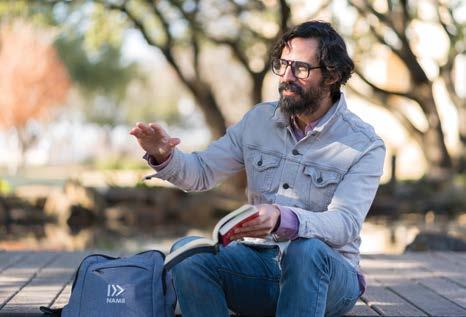
“Evangelism and global missionary outreach are things Southwestern has done well and faithfully for more than a century,” McClellan concludes.
Ashley Allen (’03, ’09) is managing editor of Southwestern News.
Clara Molina (’13) is a writer for Southwestern News.
Academic Degrees
Certificate of Ministry Studies
Certificate in Church Planting
Associate of Arts in Christian Studies
Bachelor of Arts in Pastoral Ministry
Bachelor of Arts in Christian Studies
Master of Theological Studies
Master of Theological Studies with concentration in Missions
Doctor of Ministry in Evangelism and Missions
Doctor of Ministry in Pastoral Theology
SPRING 2022 33
8/8
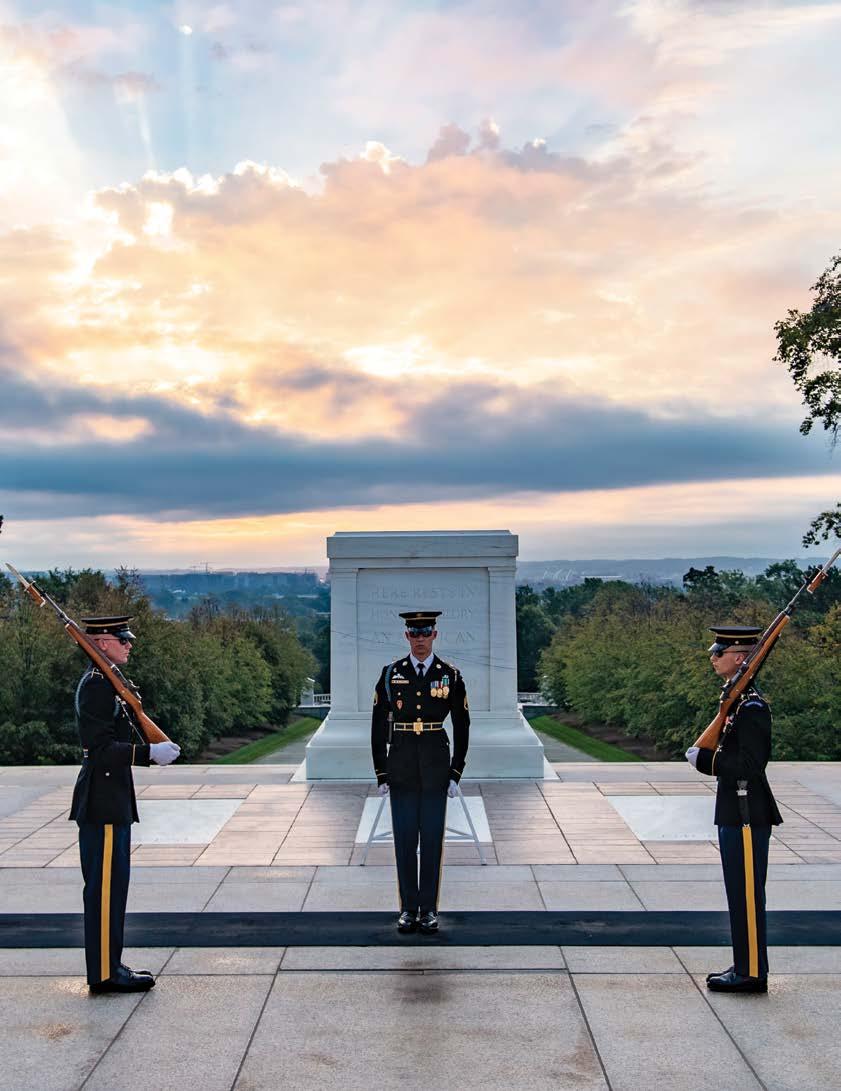
Ministry Among the Rank and File
Brandon Denning’s service to God and country
BY ASHLEY ALLEN
On the Virginia side of the Potomac River, overlooking Washington, D.C., and the nation's tributes to the fallen of World War II and the Korean and Vietnam wars, Arlington National Cemetery serves as a silent reminder freedom comes with a cost.

Opened in 1864 by the then-War Department as the nation’s military burial site, the cemetery is the final earthly resting place for over 400,000 of the country’s active-duty service members, veterans, and their eligible dependents dating back to the Civil War. On carefully placed white grave markers that make up the cemetery’s perfectly lined rows, the names of men and women who have worn the flag of the United States as a member of one of the five branches of the military are etched in capital letters on each of the tombstones.
Except one.
In section 48 of the cemetery, resting at the top of the stairs leading to the east side entrance of the cemetery’s Memorial Amphitheater, is the Tomb of the Unknown Soldier. The most iconic of all of Arlington’s memorials, the tomb’s sarcophagus bears no name. Engraved on the tomb’s west side panel are the words, “Here rests in honored glory an American soldier known but to God.”
Dedicated on November 11, 1921, the third anniversary of the conclusion of World War I, the tomb is an official military post and, since 1948, has been guarded 24-hours-a-day by a special group of guards from the 3rd U.S. Infantry Regiment — “The Old Guard.”
The memorial site is a solemn and quiet place as visitors reflect on military service while watching the sentinel on duty take 21 measured footsteps before pausing for 21 seconds, turning to face the tomb for
SPRING 2022 35
2/6
21 seconds, and turning to repeat the pacing as he stands guard over his fallen comrades’ remains. The lone sounds come from the steel shank on the inside of the heels of the sentinel’s shoes that enable the soldier to “click” during certain movements, such as the changing of the guard. The respect and dignity warranted at the site are unspoken, though signposts serve as muted reminders and military personnel serve as verbal reminders when necessary.
Though almost 700 men and women have been awarded the Tomb Guard Identification Badge (TGIB) since counting began in 1958, only one person has served as a member of The Old Guard and returned as a chaplain to the guard unit: Chap. (Maj.) Brandon Denning, a 2008 Master of Divinity graduate and the 453rd guard at the Tomb of the Unknown Soldier.
Growing up in South Mills, North Carolina, Denning had “no real aspirations at the time to go into ministry or the military.” Though he made the decision to follow Christ as a 13-year-old, he says he began to ask questions about his faith “because I wanted to be serious about following the Lord.”
Following high school graduation, Denning enlisted in the United States Army. The U.S. Army’s 1990s recruiting slogan, “Be all that you can be,” inspired Denning, but so did stories of his grandfather.
Roy Denning, an Army Technical Sergeant (TSgt) who served in World War II, was responsible for transporting U.S. servicemen to the beaches of Normandy for the D-Day invasion on June 6, 1944. Though he passed away before Denning was born, the younger Denning was motivated to serve his country, specifically through the Army.
After Denning began his time of service in the Army in May 1996, assignment at the Tomb of the Unknown Soldier was not automatic but required try-outs through a rigorous initial selection process that included height and weight requirements, a high score on physical fitness, and a security clearance due to proximity to dignitaries who visit the site. Once these standards are met, sentinel hopefuls then visit Arlington’s grounds in groups for further testing.
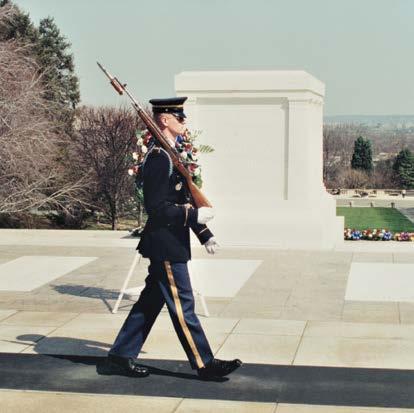
“There are trials twice a year and you went and tried out and if you did not pass the requirements at any point, they failed you,” Denning explains.
When Denning went with his group of seven comrades for try-out at Arlington in 1996, the group was tested in three areas: history of the cemetery, military uniform, and the “manual.” Each of the areas is graded and “it’s very much of a mental kind of game that you have to go through” as candidates must memorize the locations of fallen soldiers and dignitaries, as well as the history of the cemetery, keep their uniform to the Sentinel Creed’s standard of perfection, and do all actions according to the manual for service as a sentinel, including walking, timeliness, and other standards.
“The idea is for us to give our best to the unknowns,” Denning explains. “Everything is very rigid and meticulous.”
Only two soldiers were selected as sentinels in 1996, and Denning was one of them.
While calling the opportunity to serve as a sentinel “very rewarding,” Denning says the time he spent as a guard, from 1996-1999, gave him the perspective “that life is fleeting [and] there are sacrifices that have to be made for our freedom.”
Denning correlates “a lot of the Tomb of the Unknown Soldier to the sacrifice that our Savior has made for us on the Cross,” though he is careful not to take the analogy too far.
“I think we have to realize that life is about sacrifice and sometimes we are going to be called to sacrifice for the greater good and that’s exactly what those soldiers represent,” an emotional Denning explains. “They lost everything, to include their identities, and that is something this country nor I should take lightly.”
The site as it is known today was built in 1926, with the remains of
Southwestern News 36
“I wanted to be serious about following the Lord.”
3/6
- BRANDON DENNING (’08)
Chap. (Maj.) Brandon Denning ('08) is the only person in the U.S. Army history to serve as a guard at the Tomb of the Unknown Soldier and a chaplain to the guard unit.
the World War I unknown soldier buried under the sarcophagus. The crypt in front of the sarcophagus is divided into three sections and holds the remains of U.S. soldiers from World War II, the Vietnam War, and the Korean War. In 1998 DNA testing identified the remains of the Vietnam Unknown serviceman.
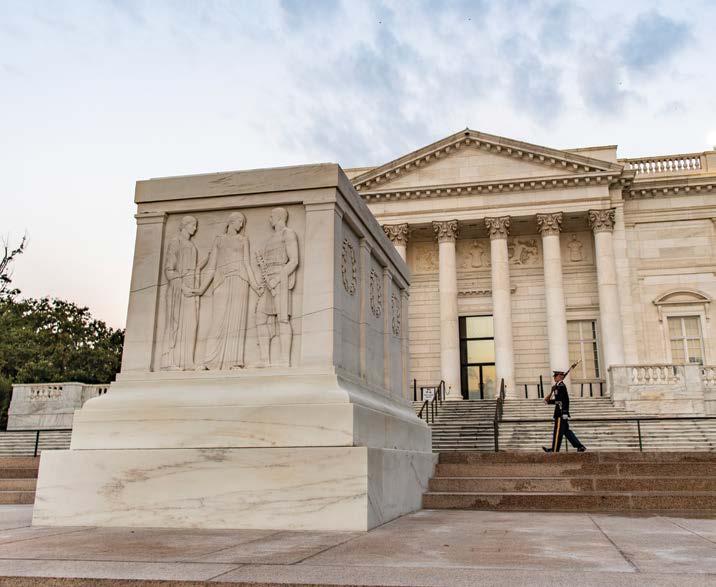
“I had the honor in 1998 to guard the Vietnam Unknown while his remains were being removed for DNA testing and identification and later be a part of the ceremony,” Denning says. “Twenty-four years later, words cannot express the emotion of witnessing Air Force Cpt. Michael Blassie identified as the Vietnam Unknown Soldier and returned to his family and given the proper funeral he deserved. It was a great privilege to guard Cpt. Blassie and maybe be a part of helping restore honor to the brave men and women who did what their country asked of them in Vietnam.”
Though he “was successful in the Army, by the world’s standards,” Denning explains he was “really falling apart spiritually.” He says it is one of the reasons he “got out from a first enlistment” in 1999.
He enrolled as a student at the University of Tennessee at Chattanooga and the singles’ pastor at the local church, who was also a friend, began to mentor and disciple him. During this time Denning “was wrestling with a call to ministry” but had “no plans of coming in as a chaplain.” However, his friend took him around to visit seminaries and Denning landed in Fort Worth at Southwestern Seminary, calling it “one of the best places that I visited.”
When Denning originally began as a seminary student in 2004, he was focused on counseling. However, a change in the program was the “conduit” that led him to begin working on a Master of Divinity degree with biblical languages and a concentration in pastoral counseling. While he was a student, Denning was exposed to the ministry of chaplaincy and “appreciated the mixture of the academics and the practical side of ministry” that professors taught him. As a student, Denning was a chaplain at the fire department in Edgecliff Village, located near Seminary Hill.
Denning explains the results of his education at Southwestern are
SPRING 2022 37
4/6
two-fold. His courses provided a foundation for ministry as he learned doctrinal understanding of the basic tenets of faith, but he was also compelled to continue learning.
“I think a great school is one that encourages you to continue your education long after you have graduated,” he says. “That is exactly what Southwestern taught me. I felt like I had a great education at Southwestern. It really prepared me not only to minister in the real world, but also to pastor a church.”
Following graduation from Southwestern in 2008, Denning was commissioned as a chaplain in the Army and assigned to the 82nd Airborne. He had heard how chaplains helped one of his Army comrades who had been injured in Iraq and the friend encouraged Denning to pursue military chaplaincy.
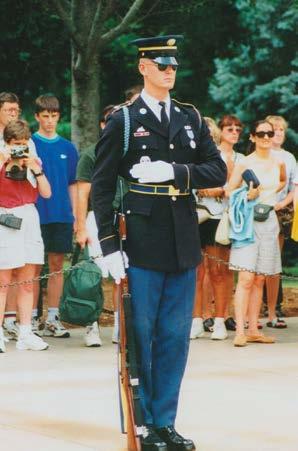
Denning became a student at what is now known as the U.S. Army Institute for Religious Leadership located in Fort Jackson, South Carolina, in 2009. At the time the U.S. Army was in the process of a surge in Afghanistan and, following chaplain school, he was deployed to Afghanistan with the 4th Brigade of the 82nd Airborne. After his 20092010 deployment, he returned to Fort Bragg in Fayetteville, North Carolina, and was reassigned to Arlington National Cemetery.
For six months Denning conducted funerals at the cemetery until he was reassigned as chaplain to the 4th Battalion – the battalion in charge of the Tomb of the Unknown Soldier, a role he served in for three years and that he calls “a great fit” and “a real joy.”
Denning values the role of military chaplains as they help soldiers who have questions about life, death, and suffering.
“I think that an individual’s spiritual life, whether they want to recognize it or not, is important,” he explains. “Something as simple as where we come from and where we’re going are theological questions, … whether we realize that on the surface or not. Those are all questions we all are looking for answers to and it’s the military chaplain that can kind of help with those questions and help someone as they’re faced with those types of questions in life, especially when faced with death and suffering. They move to the forefront of a soldier’s mind fairly quickly.”
Today, Denning uses the lessons he learned at Southwestern, coupled with his hands-on experience, to serve as an instructor of homiletics at the U.S. Army Institute for Religious Leadership in Fort Jackson, where he instructs the Army’s incoming chaplains in the areas of teaching and preaching.
Currently, there are over 3,700 chaplains endorsed by Southern Baptists through the North American Mission Board (NAMB)–approximately 1,500 of which are military chaplains.
“The chaplaincy is a unique and specialized ministry that operates outside the walls of the local church,” says Chaplain (Maj. Gen.) Douglas Carver who currently serves as the executive director of chaplaincy for NAMB. Carver explains the role of chaplains as a “ministry of presence” that is reflective of the love and compassion of Christ.
“Chaplains have an inherent value to the ministry of church in the fact that they deploy into places where the church has limited or no access—behind the walls of prisons, beside a police officer in their
Southwestern News 38
“Something as simple as where we come from and where we’re going are theological questions.”
5/6
- DENNING (’08)
patrol car, in a combat zone with their troops, on the wards of hospitals and medical centers, inside the cordon of a disaster site, or at a corporate staff meeting with their CEO,” Carver explains. “Regardless of the institutional setting, chaplains have one primary mission: to share the Good News of Jesus Christ with those fighting for their lives, seeking forgiveness or reconciliation, facing the fear of life or death, or looking for hope in a hopeless situation.”
Carver, who previously served as the 22nd chief of chaplains in the United States Army, calls Denning “one of our best not only in the SBC, but in the entire military chaplaincy” noting in his ongoing ministry “Chaplain Denning continues to faithfully represent the Lord Jesus Christ and Southern Baptists as he shares the Gospel with soldiers and their family members.”
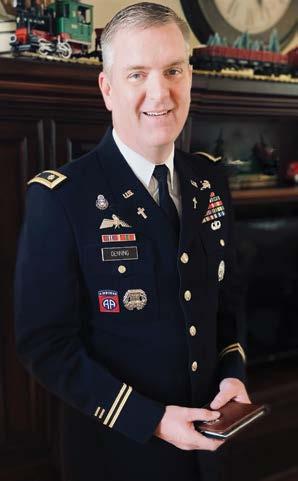
For his part, Denning seeks to be faithful as he teaches the next generation of Army chaplains to be “real with people” and “genuine about who they are in the Lord” and as human beings. Through his 20 years of ministry experience and 17 years of military service, Denning says there is one “foundational” concept to have “if you want to be able to relate to others and be able to relate God to others.”
“There are a lot of things that we focus on here at the school,” he observes. “Ultimately, it’s bringing God to soldiers and soldiers to God. But in order to do that, I truly believe that we have to be comfortable with our relationship with God and our relationship with who we are as people or as a person and who God made us to be.”
As Denning reflects on his service as a guard at the Tomb of the Unknown Soldier and his current ministry training military chaplains, he recognizes “death is something that most soldiers don’t consider, but it is shockingly final and it hurts...it really stings.”
Denning explains tomb guards memorize a lot of poetry related to honoring the dead, including a poem written by 1948 medal of honor recipient, and East Texas native, Audie Murphy. The late World War II hero’s poem reads, in part,
“I hear no protest from the mute lips of the dead; They rest, there is no more to give.”
“Audie Murphy was right in some sense,” Denning concludes. “We do not hear the mute lips of the dead and there is no more that they can give. However, death doesn’t have to be this final. The Apostle Paul also wrote a poem to the church of Corinth:
‘Death, where is your victory?
Death, where is your sting?
But thanks be to God, who gives us the victory through our Lord Jesus Christ!’”
SPRING 2022 39
Ashley Allen ('03, '09) is managing editor of Southwestern News.
Photos for this article were provided by the Denning family and Arlington National Cemetery.
“Ultimately, it’s bringing God to soldiers and soldiers to God.”
6/6
- DENNING (’08)
EVANGELISM ON PURPOSE
How Joshua Crisp makes evangelism a priority at his midwestern church
 BY TOBIN PERRY
BY TOBIN PERRY

Gary Wells isn’t the kind of man you’d think would thrive on a mission trip to Kenya where evangelism was front and center. Reserved and quiet, he wasn’t accustomed to regularly sharing his faith.
But that changed in Kenya earlier this year, where the team from his church hit the streets to share the Good News in a nearly constant manner. Wells shared the Gospel multiple times and led people to faith in Jesus.
“We had three or four Kenyans with us translating for us,” said Wells, who is semi-retired. “They pretty much led the way, so you didn’t have to figure out who to talk with. They would ask people if they wanted to hear what was going on. If someone had no interest, they’d just move on. Then, out of pure repetition, it simply got easier.”
Wells’ surprising evangelistic fluency in Kenya didn’t come by accident. His pastor, Southwestern Seminary graduate Joshua Crisp (’16), had planned for it and put him in a situation where he could get practice in a less-threatening manner. In less than two years as the church’s lead pastor,
Southwestern News 40
1/6

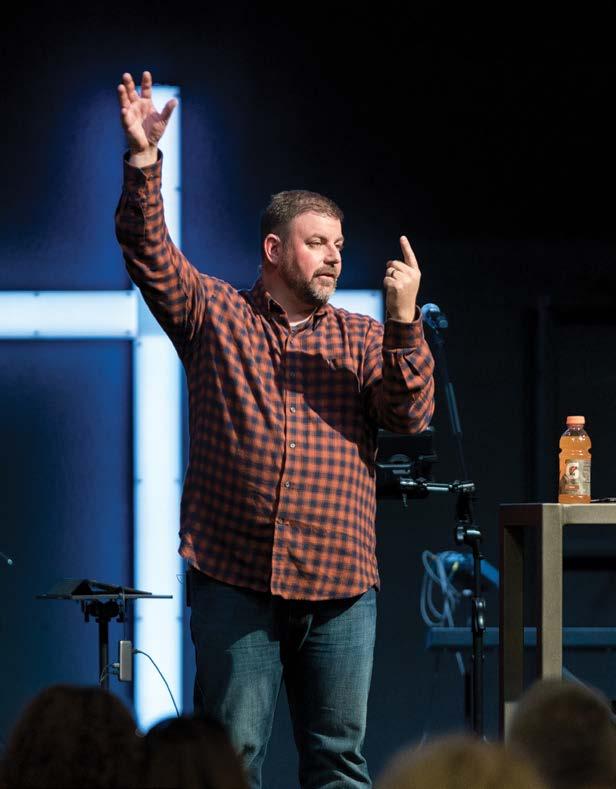
Crisp had been shepherding the entire congregation toward this kind of intentional evangelism. The mission trip to Kenya was simply the latest step in this disciple-making process.
When the team members returned to First Baptist Church of Bethalto, Illinois, Wells’ words to the congregation during their testimony time were simple: “If I can do it, you can do it. You don’t have any excuses anymore.”
A N INTENTIONAL MINISTRY OF EVANGELISM
Just take a quick look around the gym where the people of First Baptist Church worship weekly and you can see the intentionality of Crisp’s ministry firsthand. Near the church’s stage sits an easel with a sign reading, “Gospel Conversations,” where congregants can mark when they’ve shared the Gospel during the week.
On the back wall, you’ll find a nicely designed poster describing the church’s 10-year goals:.
• 10,000 Gospel conversations;
• 500 people baptized;
• 300 new members;
• 1,000 people on mission projects and trips;
• 5 church planters trained and sent out;
• 1,000 people saved;
• 250 members lead others to Christ;

• 25 growth groups started; and
• $500,000 given to church planters and missionaries.
At the welcome center outside of the weekly worship gathering, worshipers can pick up a simple card where they can write their “top five” people whom they are praying for opportunities to share the Gospel.
Everything in the building seems to point to one overriding focus, all encapsulated in the church’s mission statement:
“Making disciples here at first then there.”
Crisp pursues his leadership at FBC Bethalto, in much of the same way he did as a church planter in Indianapolis—with a single-minded focus on evangelism.
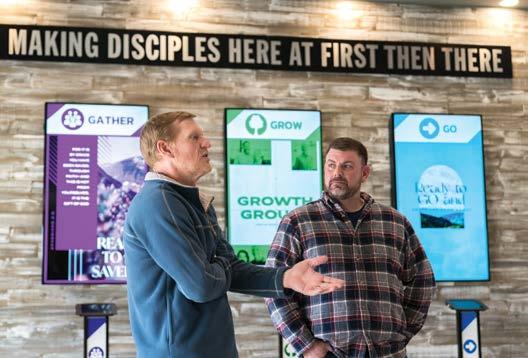
“When I put Gospel conversation boards up every single week, there is an expectation that I’m supposed to be intentional with my faith,” Crisp said. “When the pastor tells me I’m supposed to have a top-five list of people I’m telling my story to, that’s being intentional. If you go to Africa with me, you’re going to be sharing the Gospel. And then when you come back, you’re going to do the same thing here.”
Crisp focuses on three elements in his efforts to make intentional disciples. First, he trains people to share their testimonies. Second, he shows them how to communicate the Gospel using a simple technique called, “The Five Fingers.” Finally, Crisp encourages everyone—including himself—to identify a list of people with whom they are sharing the Gospel.
AN INTENTIONALITY BORN FROM HIS OWN STORY
Crisp’s passion for evangelism comes from his own testimony, he says. He grew up in church and came to faith at a church camp when he was 15, yet Crisp would be the first to say he wasn’t living like a Jesus-follower.
“I moved out of the house, and then started doing stupid stuff,” Crisp said. “I became an alcoholic pretty much overnight, started living wild ways.”
At age 24, Crisp joined the United States Army, a decision that eventually shook his spiritual life. As he arrived at his first duty station in Fort Benning, Kansas, he received orders to go to Iraq for a year.
Crisp said: “That’s when God really grabbed me and said, ‘You’re not living right. You’re a child of mine, but you’re being
Southwestern News 42
3/6
disobedient. You’re being a prodigal.’”
At that point, God gave Crisp his life verse: “Haven’t I commanded you: be strong and courageous? Do not be afraid or discouraged, for the Lord your God is with you wherever you go” (Joshua 1:9, CSB). Over the next year, as Crisp served in Iraq, God got his attention through the loss of two friends who were serving with him.
God continued to work on Crisp, first through a dating relationship and eventual marriage to a strong Christian woman, and then a friendship with an Army captain on his second tour in Iraq. By the time he wrapped up his four-year enlistment in the Army, he was ready for a fresh start with God.
“I knew I had to make some changes before I went back to my new wife,” Crisp said. “That’s when I said to God, ‘I don’t want to drink anymore. I don’t want to party anymore. I have a wife now. All I want to do is focus on You, and You tell me what You want me to do.’”
But, Crisp says his long battle with alcohol and an ungodly lifestyle is a big reason why evangelism became such an important part of his life.
“I always put myself in the position of lost and unchurched people,” Crisp said. “I have a heart for them. There were times I was plastered at three or four in the morning, and I wanted a man to go knock on my door and say, ‘What are you doing?’ It was lonely at times.”
SOUTHWESTERN FANS EVANGELISTIC FLAME
In time, Crisp recognized God was calling him into ministry and started looking for a seminary program. When he learned Southwestern offered classroom credits for mission trips, he was hooked. Getting credits for sharing the Gospel seemed like a dream come true.
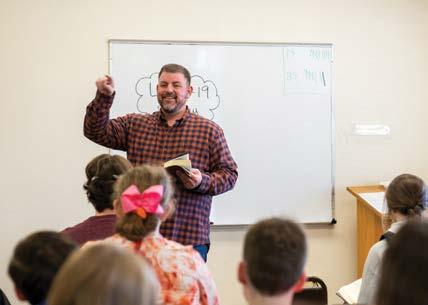
“After that, we knew where we wanted to be,” said Crisp, who started his studies at Southwestern in 2014. “We just fell in love with what they were doing.”
While at Southwestern, Crisp took mission trips to both Baltimore and Madagascar. Already feeling led toward church plant-
ing, those experiences exposed him to church planting practices both in the U.S. and abroad.
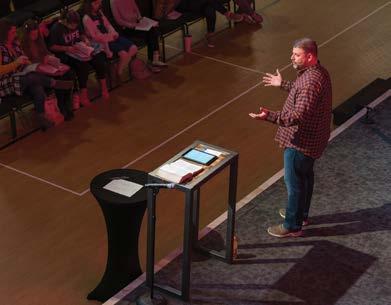
Crisp also appreciated the opportunity to learn ministry from professors who were active in serving local churches. He particularly noted the ministries of Matt Queen and Tommy Kiker.
“Those guys don’t just talk about ministry; they’ve done ministry,” Crisp said. “They were very real and raw. Dr. Kiker didn’t give fluff. He said this is how pastoral ministry is going to be. It’s going to be tough. It’s going to be enjoyable and joyful, but it’s also going to be hard.”
“From Dr. Queen, I learned a lot about how to share the Gospel. I learned different tools and different traits that he taught in his evangelism class. We became friends. I started picking his brain, saying, ‘I’m going to plant a church. What do you think of me
doing this or that?’ Then he started not just being a professor — but he started pastoring me through these decisions,” Crisp says.
The two stayed in touch after graduation, and they’ve ministered together in congregations where Crisp has served.
“A lot of students, when they come in to one of my classes at Southwestern, they’re very much focused on the grades,” Queen said. “Josh did fine and graduated, so he made the kind of grades that he needed to make. But Josh was really concerned with learning the how to [of ministry].”

SPRING 2022 43
4/6
“That’swhenGodreallygrabbedmeandsaid, ‘You’renotlivingright.You’reachildofmine, butyou’rebeingdisobedient.You’rebeinga prodigal.’” -JoshuaCrisp(’16)

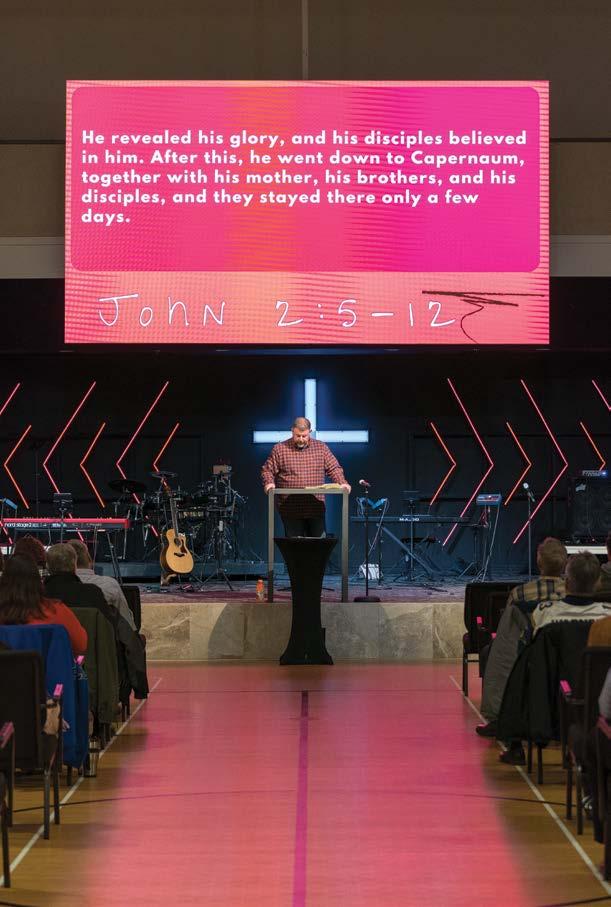
CHURCH PLANTING IN INDIANAPOLIS
During Crisp’s first year at Southwestern, he learned about the North American Mission Board’s Send North America initiative, which helps Southern Baptists plant churches in the most influential and unreached cities on the continent.
“I didn’t want to be a traditional pastor, sitting behind a desk with a suit and tie,” Crisp said. “That didn’t resonate with me.”
His pastor back in Illinois, Sammy Simmons ('03), had been casting a vision for church planting in Indianapolis. As Crisp learned the city was 90 percent lost and of the need for churches, God broke his heart for the city.
After graduating from Southwestern in May 2016, Crisp and his young family headed to Bargersville, a small bedroom community of 10,000 just south of Indianapolis. With only three churches and a total average attendance of 300, the suburban community desperately needed Gospel-preaching churches.
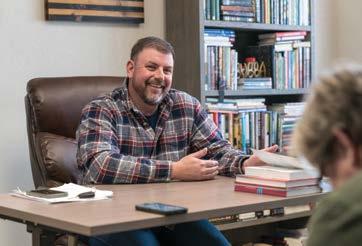
Immediately, Crisp focused on an intentional plan of evangelism. He shared the Gospel everywhere he went. He taught the new church plant about personal evangelism, using practical tools that simplified it for lay leaders.
Crisp also invested in the community, building relationships with everyone from city leaders to first responders to the service staff at restaurants he frequented.
As God blessed these relationships, Crisp earned opportunities to share the Good News. When his evangelistic efforts and the efforts of his congregation bore fruit, other churches in the area—and around the state—asked Crisp to teach them how he was doing it.
John Horn (’86), a Southwestern alumnus, trustee, and the team leader for church health at the State Convention of Baptists in Indiana, worked with Crisp frequently while he
Crisp believed he was in Indianapolis for the long haul, and he had great dreams for what laid ahead. The church plant was thriving—even throughout 2020 when COVID restrictions made meeting more difficult.
But Crisp began sensing God wanted him elsewhere.

was in Indiana. He calls Crisp a natural evangelist.
“I’ve gone and had breakfast with him and seen how he can just be friendly with a waitress. And before you know it, he’s got her in a Gospel conversation,” Horn said. “She’s sharing things from her heart and wants him to pray with her. That’s just the way he is.”
A GOSPEL-SIZED MOVE TO ILLINOIS
In November of 2020, Crisp accepted a call to First Baptist Bethalto. The community, which describes itself as a “village” on its website, is a small town of 10,000 about a half an hour northwest of St. Louis, Missouri. Like many small towns in the Midwest, you’ll find churches throughout the community. Many, including FBC Bethalto when Crisp arrived, were struggling.
Chris Slusser, who was a member of the pastoral search team that called Crisp, says part of the reason the church asked him to serve is that they believed he would push the church into new directions.
“This has been a great church,” Slusser said. “But we’re slowly dying. Attendance was decent, but we were dying a slow death over 10 to 20 years, if we didn’t hire the right person. I wanted to hire someone who would shake things up, turn the church upside down, and push us way out of our comfort zones.”
Less than two years into his pastorate, that’s what Crisp is doing. He has leaned into his experience as a church planter to cast a vision with evangelism at its center. Crisp has led the church to pursue aggressive 10-year goals that would have been unimaginable just two years ago.
Despite the ambitious nature of those goals, the heart of Crisp’s ministry has been working one-on-one with the church’s leaders, helping them understand how to do evangelism. That’s meant multiple conversations over coffee or lunch where he compares notes about top-five lists and testimonies. Then he asks them what’s getting in the way of having Gospel conversations with those on their lists.
But maybe most importantly, Crisp shares his own stories—stories about Gospel conversations in his own life.
“As much as I’m talking about it every single week, I’m doing it,” Crisp said. “If I haven’t had a Gospel conversation, I’ll go somewhere and have one.”
“Because they’re everywhere.”
Tobin Perry is a writer for Southwestern News.
SPRING 2022 45
5/6
“I didn’t want to be a traditional pastor,sittingbehindadeskwitha suitandtie,”Crispsaid.“Thatdidn’t resonate with me.”
RESOLVED: BUILDING BRIDGES DURING WAR

Yaroslav Pyzh’s Gospel ministry in his Ukrainian home
BY ASHLEY ALLEN

*Editor’s note: This article is based upon three interviews with Yaroslav Pyzh, which took place on September 16, 2021, February 26, 2022, and March 28, 2022. Events in Ukraine may have changed significantly since the article was finalized.
“It’s my home.”
Uttered gently, yet resolutely, the desire to serve “where God called” him in his native-Ukraine homeland is why Yaroslav Pyzh (’09, ’12) chose to stay in the Eastern European country as Russian forces invaded. Pyzh made the decision long before Ukrainian President Volodymyr Zelenskyy mandated Ukrainian men between the ages of 18 and 60 remain in the country to fight on behalf of their country.
Since the war began in the early morning hours of February 24, Pyzh says millions of Ukrainians have fled to the neighboring countries of Poland, Moldova, Hungary, and Romania. Pyzh, who has served as the president of the Ukrainian Baptist Theological Seminary in Lviv, Ukraine, since 2013, led his faculty and staff to adjust their focus so they could minister to their fellow Ukrainians.
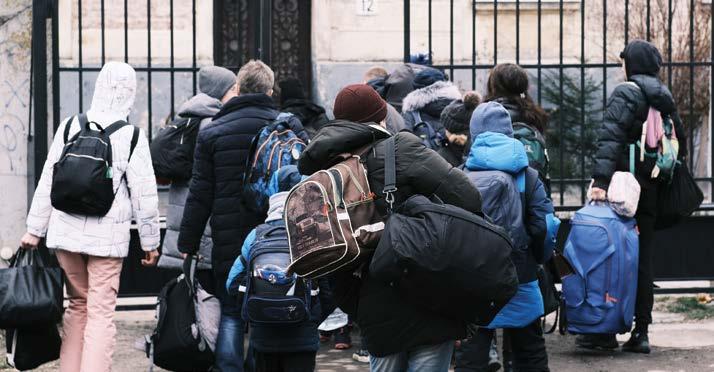
“One day you are teaching theology, doing academic work, and the next day you are serving the needs of people,” Pyzh says. “And I think that’s the best way it’s supposed to be. If things change, you have to change. If that’s a time of serving their needs, that’s what you need to do. If it’s time to teach, you teach.”
When the war began, Pyzh and his staff transitioned their seminary from an institution of theological education to a facility where faculty, staff, students, and alumni are the hands and feet of Jesus to the displaced Ukrainians traveling through Lviv seeking to make it the last 40-miles to the shared border with Poland and safety.
Serving the needs of their fellow Ukrainians has meant converting
three of the seminary’s buildings into makeshift dormitories for displaced people. The buildings, which were completed earlier in 2022, were designed to equip students to share the Gospel. During the first 33 days of the war, in the same buildings, the UBTS team has shared the Gospel, conducted daily worship services, and led people to faith in Christ as more than 5,000 women and children have come through the campus for help on their way out of the country.
The provision of buildings is just one of the ways Pyzh says he has seen God go before him as He has positioned the seminary to offer aid to their fellow Ukrainians. When the war first began, the seminary was helping 400 people daily. By the middle of March, that number dropped to an average of 150 people daily.
The work and ministry of the seminary caught the attention of international news outlets early in the war – including “NBC Nightly News with Lester Holt,” which featured the seminary’s work in the March 2 newscast.
While the seminary has been able to assist Ukrainians in Lviv, they have also been able to offer support and supplies to another 5,000 people across the country, due in part to many Southern Baptists. Send Relief, Texas Baptist Men, and Baptist Men of North Carolina have “given money to buy humanitarian aid” supplies or have supported the seminary through other means, Pyzh explains. Another provider has been Goya Foods, an American-based Latin foods company that has supplied the seminary with canned goods. The seminary’s own American-based Ukraine Partnership Foundation has also raised support to aid UBTS and its work.
The assistance has enabled the seminary to maintain a route from Poland to Lviv to receive supplies. Once in the city, “people from other parts of Ukraine come into Lviv and pick up those loads and take it to
Southwestern News 48
3/6
the places that have the greatest need” across the Eastern European nation, Pyzh says.
Stories of people finding hope in Christ have been part of the testimony of the school’s ministry. During the March 28 interview, Pyzh shared, “We had a miracle happen today.” He explained during the morning’s daily chapel service, the leader of the service spoke of a bullet-proof vest for physical protection, and asked the worshippers, “What defends your body from spiritual bullets and how can you protect yourself from that?” Following the service, a lady approached the leader and said, “I would like to accept the Lord Jesus Christ as my Savior, and what can I do about that?” The leader explained the Gospel to her and, “They prayed, and she accepted the Lord,” Pyzh says.
UBTS, which had been teaching classes until the day before the war began, has trained Ukrainians in theological education since its founding in 2000. Seminary leadership is determining how to facilitate a September graduation for their students, while noting it is “a

very ambitious goal” but also one that “excites us and gives us a bit of encouragement,” Pyzh explains.
As the school seeks to prepare to commission their students, Pyzh says they are also working to help Ukrainian believers recognize their displacement to other parts of Europe “is actually an opportunity to change their identity from being victims to being ambassadors of the Gospel,” similar to how God used the church in Jerusalem when they were scattered during a time of persecution.
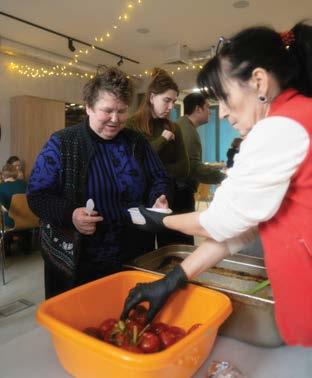
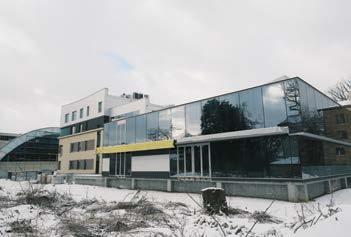
“Most of the people right now, they look at themselves as the victims of the war – refugees,” he says. “But really, if you turn that upside down, they’re not victims. They’re not refugees. That’s the way that God was using the church in Jerusalem. That’s the same way He’s sending out us opening the hearts of people around the globe in Europe, particularly those that were skeptical … and most difficult one[s] to reach. Now, they accept Ukrainians and invite them to live in their own homes.”
Pyzh says the 250,000 to 300,000 believers from Ukraine are more
SPRING 2022 49
“One day you are teaching theology, doing academic work, and the next day you are serving the needs of people... And I think that’s the best way it’s supposed to be.”
4/6
YAROSLAV PYZH (’09, ’12)
than any other European nation and God can use these believers as a “bridge” between the church and Europeans who are usually “skeptical” of the Gospel. He says he sees two things that have “never happened before” in the situation “that is unveiling in front of us.”
First, he says, “the war united every single person in Europe around Ukrainians,” which has resulted in the rest of Europe helping and accepting Ukrainian refugees. As a result, the second thing that has happened is other Europeans have “shared in the pain and suffering the Ukrainian people are having” and “it’s actually opened them to listen to the Gospel.”
Thusly, Pyzh explains, the Ukrainian people are “the bridge between national churches and the national people in those countries.”
“Christians in different countries, using Ukrainians as the bridge, can actually effectively communicate the Gospel to those people because they are open and they are participating in the life of Ukrainians,” he said. As other Europeans ask Ukrainians to, “‘Tell us your story,’ it’s impossible to tell the story of a refugee without God.”
But the teaching and training of the seminary will also continue – as an extension center in Poland. Pyzh explains International Mission Board missionaries and Ukrainians who were serving at UBTS and had to relocate to Poland will establish the extension center in Poland “in order to reach out to Ukrainians.”
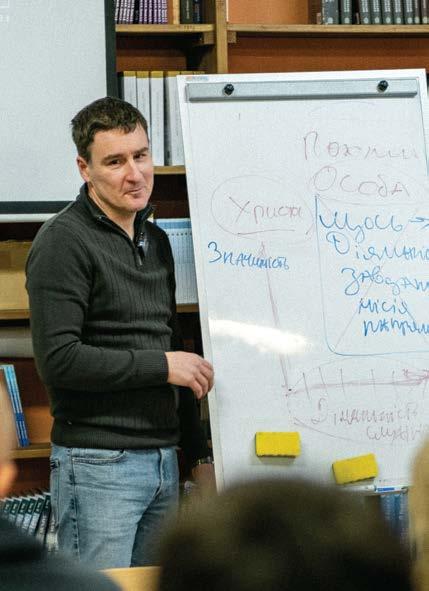
“This evil war that we have, it actually turns into something that something good can come out of it, if you use it and use it rightly,” Pyzh says. “So, I’m very excited about what God is doing in Europe. My prayer, and my desire, is to see this opportunity to be used and seized as the moment presents.”
Pyzh explains the experience of ministering while in the midst of war has changed “the way I started praying and the way I started reading Psalms. They became alive, I guess. My prayer is not that logical anymore - it used to be. Prayer is much more emotional” as he no longer “tries to reconcile” everything in his prayer time.
Pyzh also realizes his faith is different as “faith transitioned from statement, beliefs, and doctrines, into actions.” Prior to the war, Pyzh explains, “it was easy to talk about what you believe” but “in the time of war, faith is not about statements. Faith is about statements that lead to some actions.” Correlating faith to the manna God daily supplied to the children of Israel, Pyzh says, “You cannot store faith today for tomorrow,” observing that “every day requires its own faith.”
Pyzh came to faith in Christ as a 12-year-old in 1989, who was growing up in Soviet-controlled Ukraine. He attended a church and asked for a New Testament - not common in the then-communist country. After reading the Gospels, he realized his future was not that “shiny” and he “was going straight to hell,” which motivated him to profess faith in Christ as his personal Lord and Savior. From that time on he began attending a Baptist church in Ukraine.
However, Pyzh’s story doesn’t begin with his salvation experience, but rather with his grandmother and her profession of faith.
Following World War I, Russian soldiers were imprisoned in Germany and German evangelicals began to share the Gospel with the prisoners. Upon their release, the converted Russians began sharing the Gospel on their trek back to their homeland
Southwestern News 50
“Christians in different countries, using Ukrainians as the bridge, can actually effectively communicate the Gospel to those people because they are open and they are participating in the life of Ukrainians.”
PYZH (’09, ’12)
via the villages in Poland and Ukraine. Hearing the Gospel preached to her in Russian, Pyzh’s grandmother accepted Christ in her small Polish village. In 1949, Pyzh’s grandmother and grandfather were part of the contingent forcefully relocated from Poland to Ukraine under Joseph Stalin’s orders – along the same road Ukrainians are using today to flee to Poland.
Pyzh says his grandmother was “the most instrumental person” in his life as she was the one who taught him the Lord’s prayer and took him to church. Otherwise, Pyzh says he “was born to a family that was … just a regular Soviet Union family – atheists.”
After the collapse of the Soviet Union in 1991, the first missionary to Ukraine entered the country and spoke in Pyzh’s church. The missionary introduced the concept of serving the Lord and Pyzh says that is when he heard God speak to him.
“While listening to his presentation, God actually spoke to me, like directly told me, ‘I would like you to be a minister for My church,’ which did not make any sense to me because I grew up in a non-Christian family,” Pyzh explains. “So, from that time on, I was trying to … figure out what a minister for the church means. And the simplest description that I got is the person that preaches, so I started preaching at the age of 14.”
Pyzh studied at Kyiv Baptist School and earned bachelor’s and master’s degrees from Moscow Baptist Theological Seminary.
In 2006, Pyzh moved his wife, Nadya, and their then nineyear-old son and five-year-old twins to Fort Worth so he could begin working on his Doctor of Philosophy degree at Southwestern Baptist Theological Seminary. Pyzh, who studied under Malcolm Yarnell (’91), research professor of theology, focused his doctoral dissertation on the ecclesiology of Eastern European Baptists.
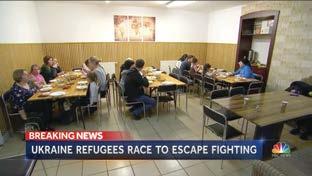
After his 2012 graduation, Pyzh assumed the leadership role of the Ukrainian seminary in 2013. Through his leadership, the seminary has focused on preparing students to serve in the local church. The result has been growth. In 2014, the seminary had 45 students and in 2021 had 1,200 students. Since 2014, each year the incoming number of students has doubled, he adds.
The lessons Pyzh learned at Southwestern taught him to “learn to love God. That’s the place where I learned to love church and people.” These are the same lessons he is using today as he loves the people of his homeland.
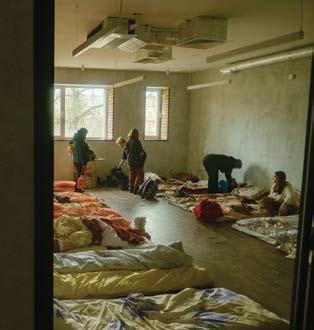
“Southwestern has been my home,” Pyzh concludes. “I hope that all the graduates of Southwestern will have the same spirit whenever they go, whatever they do. I really appreciate Southwestern. Those were very good years of my life and that’s here now, too. It was very influential.”
If you would like to help the Ukrainian Baptist Theological Seminary in their work, you can contribute at upfmissions. org and select "donate."

SPRING 2022 51
Ashley Allen (’03, ’09) is managing editor of Southwestern News.
Photos for this article were supplied by the Ukrainian Baptist Theological Seminary, the Ukrainian Partnership Foundation, and Unsplash.
“I hope that all the graduates of Southwestern will have the same spirit whenever they go, whatever they do.”
6/6
PYZH (’09, ’12)

THE ESSAY 1/4
BY L.R. SCARBOROUGH
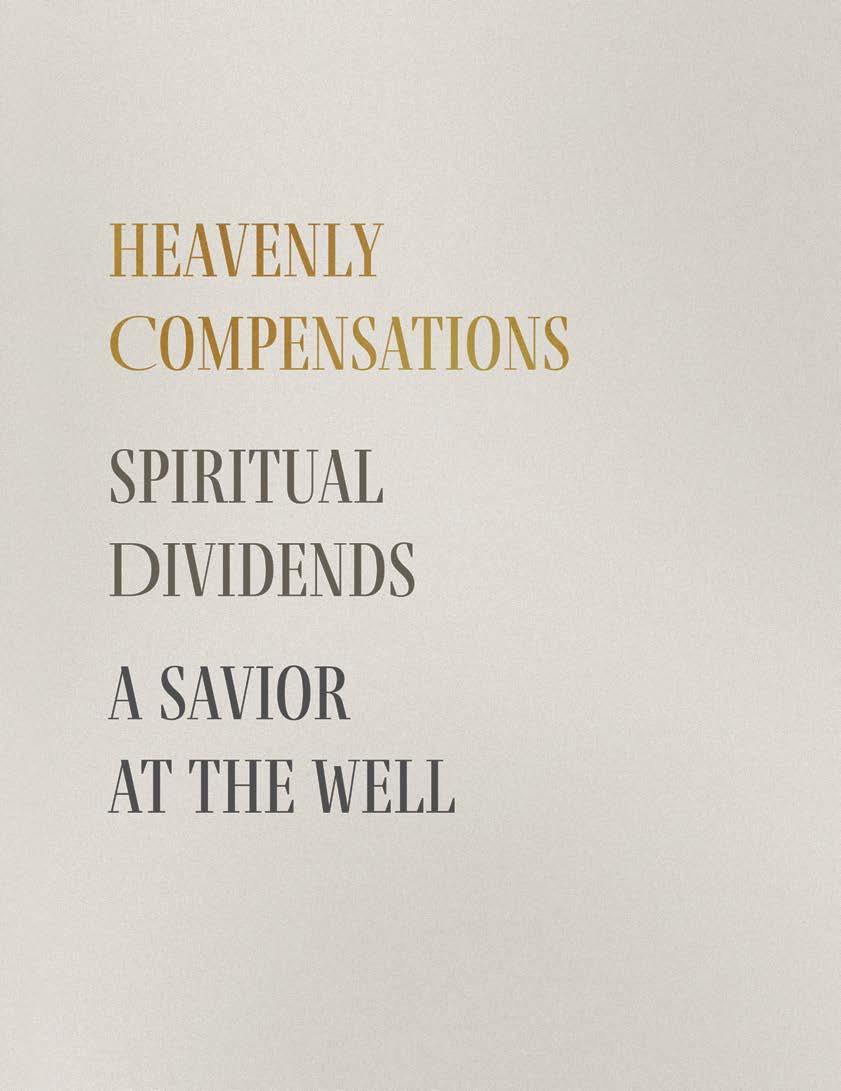
THE ESSAY
2/4
ILLUSTRATION BY GABRIEL REYES-ORDEIX
Jesus at Jacob’s well was on the run. His hour had not come. His foes were dogging His heels. He was tired, hungry, thirsty, perplexed. His holy vision was lifted. He saw the horizons beyond the Cross. He saw the continents, the seas of sin stretching between. He saw the whitening harvests. He saw the scarlet woman changed by His marvelous grace into an evangel of love, and light, going back to win her companions in sin. The returning disciples offered Him food. He said, “I have meat to eat that ye know not of.” What did He mean? He meant to say that His soul was compensated and rewarded by spiritual joys far beyond physical viands. God was giving Christ’s redeeming heart the spiritual dividends from the investments of His unselfish life and service. The supreme motivation of an individual life is dividends on investments. All commercial corporations measure their success by the dividends or returns upon their capital investments.
THE DOCTRINE OF REWARDS IN GOD’S WORLD
This is a cherished motivation held out for God’s faithful servants in both Testaments. The stars in the soul-winner’s crown are a challenge to winners. Christ was not averse to honors. The Father held out for Him the honors He held out for those who honor God. Aged Paul did not impair his humility when he spoke of the “crown of righteousness which the Lord, the righteous judge, shall give to me at that day.” No true, unselfish servant of Christ is working for a crown except the crown of Christ, but God cheers us with holding out rewards and spiritual dividends for faithful and selfless service rendered here in His name. The best of crowns are those of the heart. The richest of dividends are those coming to patient and burdened laborers in spiritual compensations and joys here and hereafter for labors rendered to Christ for His people here in this world of loss and losses.
MINISTERIAL TREASURES
The true preacher is a capitalist and makes valuable capital investments, not in gold or stocks or lands or houses, but in an enduring capital of unselfish and immortal service, and in God’s time and way He draws dividends from such capital investments. Christ says the cup of cold water given in His name to His little ones will not lose its reward and that stars are reserved for the crowns of wise soul-winners. Christ encourages the laying up of treasures in heaven where rust will not destroy nor thieves break through and steal. Who bears more burdens, renders more unselfish service to sick, sorrowing, discouraged, lost men than do the true ministers of the gospel? Is love’s labor lost? Is unselfishness unrewarded? Is spiritual capital investment void of dividends? I think not. Christ’s joymeat cheered Him on at Jacob’s well. The “joy that was set before Him,” caused Him to endure the shame of the Cross. “The mark for the prize of the high calling of God in Christ” caused Paul to press toward the goal with a single purpose and a resistless determination to win.
COMPENSATIONS OF THE GOSPEL MINISTRY
What are some of the cheering and inspiring compensations offered by God’s love to faithful ministers? They are many. Let us review them.
The joy of spiritual harvests. “They that sow in tears shall reap in joy. He that goeth forth and weepeth, bearing precious seed, shall doubtless come again with rejoicing, bringing his sheaves with him.” Pentecosts are joyous harvest seasons. There is no joy in all the radius of pleasure greater than the joy of the soul-winner. He whose business is evangelism ought to be the happiest man among men. His spiritual dividends are the richest and the best.
Spiritual and character evolution. The growth and development of our spiritual children is a source of unsurpassable joy to preachers. Paul speaking of his own converts said, “Ye are my joy and crown.” To watch and witness the marvelous transformations of grace and growth; in our
Southwestern News 54 THE ESSAY
3/4
spiritual offspring is the richest of rewards. Paul had real joy in seeing Luke, Timothy, Titus, Philemon, and the others of his winning and shepherding care brighten prisons and lighten the lashes of persecution.
The growth of Christ’s widening Kingdom, the development of educational and missionary institutions fostered by co-operating generosity help the true contributor in ministerial service as he watches these triumphs. To see a leadership we have called out and trained going on carrying Christ’s banners to higher heights is food of heavenly manna to the hearts of God’s true ministry.

To watch and have part in Christ’s unfolding will and plan for men as it drives back sin’s frontiers and goes on marching around the globe is a joy unspeakable to the hearts of Christ’s loving ministry.
To have a part in crowning Christ here and hereafter rests our weary hearts, feeds our hungry souls, crowns with many diadems of love our poor redeemed spirits as we toil on for Him. What preacher would change places with premiers or presidents or the great of earth? Our financial losses are not to be compared with our spiritual compensations.
There are a thousand little ministerial dividends accruing to our account as we try faithfully and unselfishly to serve Christ, such as the joys of loyalty to Christ, to His Word, to His commands. These myriad little co-operations with love and light and soul comforts, the peace we have when conscience approves service in His name, to have and to hold the love of sinners saved by grace, when we were God’s instruments in leading them to the light, the appreciation and gratitude of widows, orphans and aged and the shut-ins, the perplexed and bewildered whom we have comforted, counseled, guided past perils, of the young whose feet were slipping and we piloted and sent them on their way strong again, to have the dying say, “You set me right; you pointed Jesus out to me in the blinding misty ways; in darkness you brought comfort where sorrow was darkest and deepest. You pillowed my tired stormtossed life on the unfailing promises of God.” To have men hard in sin, dark in doubt, lost in skepticism, bewildered and rudderless, say, “You won me; you made Christ real,” these are “meat ye know not of” to the faithful minister, and they compensate fully for all the criticisms, persecutions, deprivations and losses in the preacher’s life.
The fuller riches of heavenly treasures, the larger dividends and spiritual compensations will appear later. “It doth not yet appear what we shall be.” The riches of His grace, the bounties of His fuller mercy, will come yet. The working out of a far more exceeding weight of glory will yet appear. The rainbows of God’s compensating mercy-love arch the horizons ahead for all God’s faithful servants. He loves, He cares, He guides, and will bring all things to a climax of eternal good for His lovers. In Christ’s service there is no earthly room for pessimism. Christ is a happy, incorrigible optimist. He is alive for evermore and must reign for ever and ever. Amen.
L.R. SCARBOROUGH was the second president of Southwestern Baptist Theological Seminary. This essay is a chapter from My Conception of Gospel Ministry by Scarborough published in the recently released The L.R. Scarborough Treasury by Seminary Hill Press.
SPRING 2022 55 THE ESSAY
4/4
“They that sow in tears shall reap in joy. He that goeth forth and weepeth, bearing precious seed, shall doubtless come again with rejoicing, bringing his sheaves with him.”
The L.R. Scarborough Treasury
New volume highlights the contributions of Southwestern’s second president
Edited by of Southwestern Seminary President Adam W. Greenway (’02) and published by Seminary Hill Press, The L.R. Scarborough Treasury is a collection of Scarborough’s well-known published and unpublished writings on evangelism and cooperation. Scarborough, the seminary’s second president and inaugural occupant of the Chair of Evangelism – “Chair of Fire” as named by B.H. Carroll – had a passion for evangelism and soul-winning that he sought to impart to his students, pastors, and lay leaders through his writings and sermons, which are included in this volume. Scarborough was also a leader and advocate for cooperation among Southern Baptists and some of his most well-known writings on the concept are included in this third volume in Seminary Hill Press’s Legacy Series.
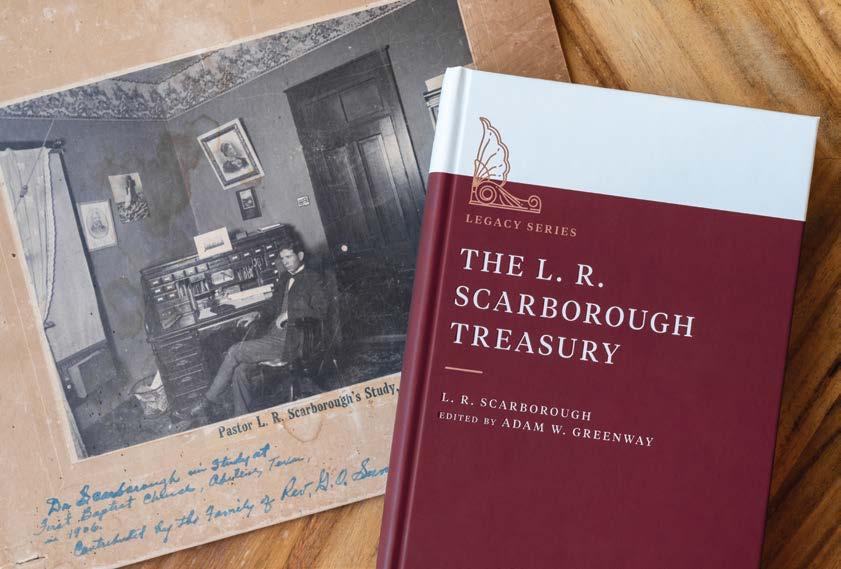
Southwestern News 56
IN REVIEW
MINISTERS OF RECONCILIATION
Lexham Press (2021)
DANIEL M. DARLING, EDITOR
JUAN SÁNCHEZ, J. DANIEL
HAYS (’92), CONTRIBUTORS
This book explores the issues of race and ethnicity from a variety of perspectives using foundational passages of Scriptures as the central point of perspective. With chapters contributed by School of Theology professors

Sánchez and Hays, Ministers of Reconciliation offers biblical and practical guidance to pastors as they address these topics in their churches.
AFTER GOD’S HEART: BECOMING WHO GOD IS SEEKING

Engedi Publishing (2021)
DERON BILES (’92, ’97)
Through examination of the life of King David, Biles leads his reader to look at their own lives in light of the question, “What will it take for you to become a man or a woman after God’s heart?” Biles seeks to convey to his readers that God loves, seeks, calls, and desires to use them the same way He did in the life of the King of Israel.
A NEW VISION FOR SBC STUDENT MINISTRY
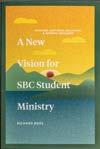
Seminary Hill Press (2021)
RICHARD ROSS (’74, ’80)
Written by Ross, with input from over 40 student and youth workers from churches, SBC seminaries, the International Mission Board, the North American Mission Board, Lifeway Christian Resources, and a number of state conventions, this book provides practical steps to implement 16 changes for student and youth ministries to aid in reaching, discipling, and sending teenagers, as well as designing a student ministry, while simultaneously holding high the supremacy of Christ.
BYLINES
Counseling leaders say biblical connections key to mental, spiritual wellness
Lilly H. Park associate professor of biblical counseling
“The church should care for people struggling with anxiety, depression, and other struggles, because hope is desperately needed. True hope is found in God (Psalm 42). The church has an opportunity to share the gospel with non-Christians and show Christians how the gospel is relevant for our problems in life.”
(on texanonline.net)
Church leaders at risk as COVID takes a toll on pastors as well as parishioners
Benjamin M. Skaug provost and vice president for academic administration
“I think the pandemic has heightened suffering, heightened isolation, heightened loneliness not only in people but also pastors. We’re trying to train pastors in new techniques, new ways and new manners in which they can carry out faithful ministry in Christ.”
(on cbsdfw.com)
Southern Baptist college, seminary professors reiterate church's role in baptism
Malcolm B. Yarnell III ('91) research professor of theology
"For Roman Catholics, they believe the priest stands in the place of Christ. The priest acts as Christ. So they don’t want to speak of the local church being engaged in baptism. Baptists are just so different from that. We do believe that baptism is done by the church, as an act of obedience to the Lord Jesus Christ in the Great Commission.”
(on baptistpress.com)
SPRING 2022 57 IN REVIEW
"In reading Scarborough, one finds a man who has strong opinions about the duties of and virtues necessary for the work of ministers of the Gospel, a key theme in his writings. The man who came of age as a cowboy in the rough and tumble of West Texas asserts in various ways that preachers must be men who are ready and willing to contend for the faith because ministry is not for the faint of heart."
—FROM THE PREFACE, THE L.R. SCARBOROUGH TREASURY
Jack MacGorman, long-time
New Testament professor, chapel namesake, dies at age 100
John William “Jack” MacGorman, long-time professor of New Testament at Southwestern Baptist Theological Seminary and namesake for its MacGorman Chapel, died Dec. 24, 2021, at the age of 100, two days shy of his 101st birthday.
“Dr. Jack MacGorman was a legendary professor of New Testament at Southwestern Seminary for more than five decades,” said President Adam W. Greenway (’02). “His influence in the lives of thousands of students and the churches and saints those students would go on to serve is beyond calculation. A Southwesterner with few equals, we grieve the loss of this great man of God with confidence that he is now worshiping his Savior in heaven today.”
Born in 1920 in Nova Scotia, Canada, MacGorman moved across the United States border to Caribou, Maine, at age 7. From 1937 to 1938, he studied at Colby College in Waterville, Maine. These academic pursuits were hindered, however, by the onset of bronchiectasis, a severe lung disease. In May 1939, MacGorman checked into a hospital for one month’s observation. He stayed for more than two years.
In 1941, despite the aid of a renowned Harvard Medical School doctor, MacGorman was dismissed from the hospital as inoperable. Following the doctor’s advice to leave the Northeast for the “high and dry climate of Arizona,” MacGorman moved south. By the time he reached Austin, Texas, however, he had run out of money. Fortunately, it was there that he recovered from his illness, and in 1945, he enrolled in Southwestern Seminary.
In a journal entry from his first day of classes, Sept. 11, 1945, MacGorman wrote of his “deep, deep sense of gratitude” to God for His
Former voice professor Frank Stovall dies at 92
Francis “Frank” D. Stovall III, retired professor of voice at Southwestern Baptist Theological Seminary, died Friday, March 4, 2022, in Houston. He was 92.
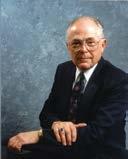
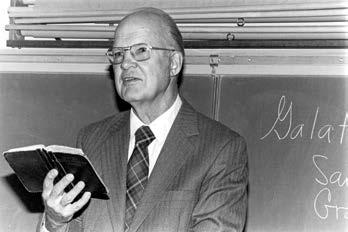
Stovall, who began teaching at Southwestern Seminary in 1957, was a renowned tenor who taught courses in voice in what is now known as the School of Church Music and Worship (SCMW). He concluded his first period of teaching at Southwestern in 1985.
Stovall was born Jan. 4, 1930, in Clinton, Mississippi, and became a believer as an eight-year-old at Clinton Baptist Church. Upon high school graduation, he enrolled as a music student at Mississippi College in Clinton, where he earned a Bachelor of Music degree with concentrations in piano and voice in 1951. In addition to earning a Master of Arts at the University of Alabama in 1955 and a Doctor of Musical Arts at the University of Texas at Austin in 1969, he did special study
mercy, for sparing his life, and for bringing him to Southwestern.
This sense of gratitude led MacGorman to commit to attend chapel as often as he could, regardless of who was preaching or singing. He honored this commitment from his first semester as a student in fall 1945 all the way through the 2010s, more than a decade after his retirement.
MacGorman completed his Bachelor of Divinity and Doctor of Theology degrees at Southwestern by 1956. In 1948, he was added to the seminary’s faculty as professor of New Testament. Serving 53 years, MacGorman had one of the longest tenures of service in the history of Southwestern.
Following his retirement in 2001, MacGorman stayed connected to the life of the seminary, helping in classes and faithfully attending chapel services and other campus events. Southwestern honored him with a Distinguished Alumnus Award in 1986 and the L.R. Scarborough Award in 2008. In 2011, MacGorman was present as Southwestern dedicated the MacGorman Chapel and Performing Arts Center, named in his honor.—Staff
at Texas Christian University in Fort Worth and the Julliard School in New York City.
As a college student, Stovall served as the organist at First Christian Church in Jackson, Mississippi. Following college graduation, he served for a year as the music and youth pastor at the First Baptist Church in Canton, Mississippi. From 1952 to 1957, Stovall was the chairman of the music department at Bluefield College, a junior college in Bluefield, Virginia. Additionally, during this time he was the minister of music at First Baptist Church of Bluefield, West Virginia, located on the Virginia and West Virginia border.
Stovall was a member of the executive council of the Southern Baptist Church Music Conference. Additionally, he was the author of Church Soloist’s Handbook published by Convention Press. In 1966, he was listed in the Outstanding Young Men of America and in 1971 he was also listed in the Outstanding Educators of America.
In addition to his cumulative 35 years teaching at Southwestern Seminary, Stovall was the music department chairman and a professor of music at Mississippi College, where he served from 1984 to 1987. He returned to Southwestern Seminary as a professor of voice in 1988, where he served until his retirement in 1995.—A. A.
Southwestern News 58
IN MEMORIAM
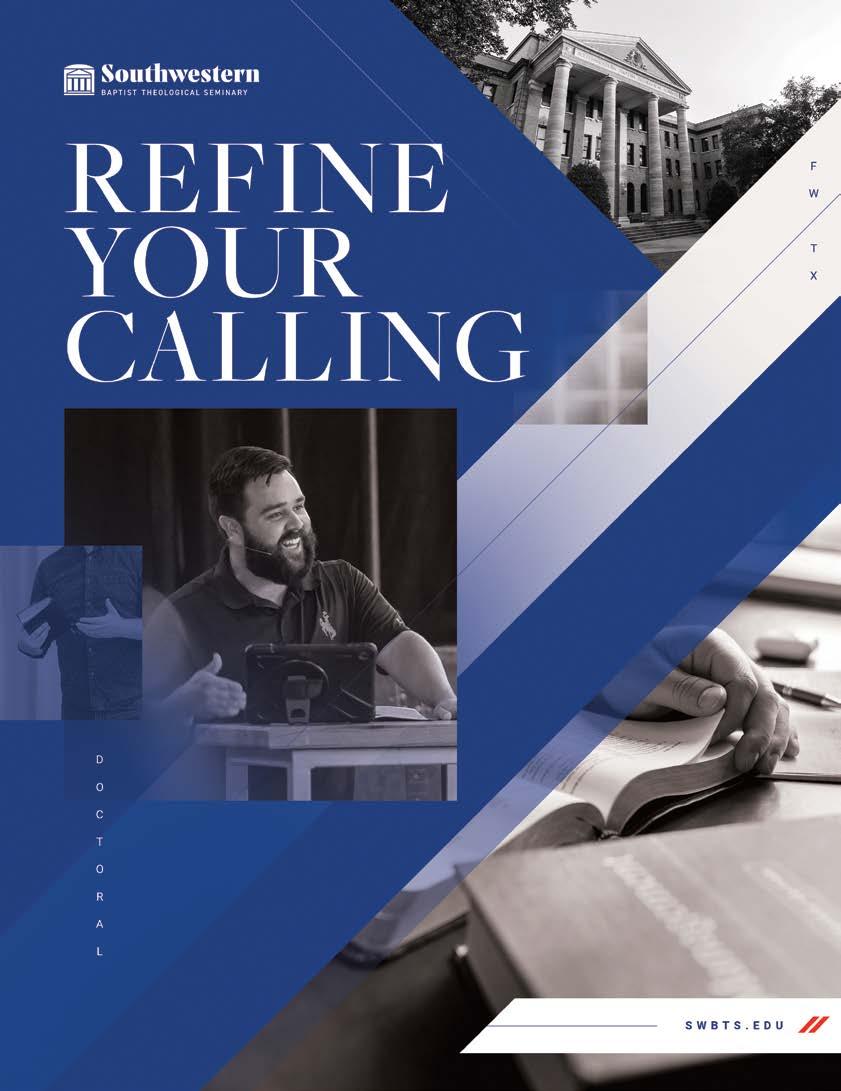
Southwestern alum, NFL Pro-Bowler
Bill Glass dies
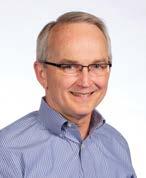
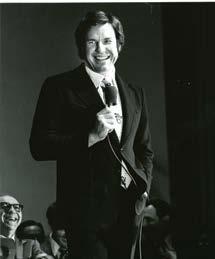
William “Bill” Glass, a 1963 bachelor of divinity graduate, passed away Dec. 5, 2021, at his home in Waxahachie, Texas. He was 86 years old.
The former Detroit Lions (1958-1962) and Cleveland Browns (1962-1968) defensive end was a four-time National Football League Pro Bowler who took classes at Southwestern Seminary in the off-season. The native Texan helped pioneer evangelical sports ministry and prison ministry through what is now known as Bill Glass Behind the Walls, a ministry focused on training believers to share their faith headquartered in Duncanville, Texas. At the time of Glass’ death, the ministry reported more than 60,000 believers had been trained to share their faith and another 1.5 million men, women, and juvenile offenders had come to faith in Christ since the ministry’s inception in 1969.
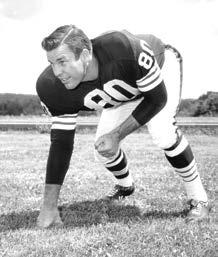
Glass began the ministry following the
encouragement of the late Billy Graham. Following his 11 seasons in the NFL, Glass took part in the televised Billy Graham Crusades sharing his personal testimony of faith. Graham encouraged Glass to become a city-wide evangelist. In 1972 ,Glass began sharing the Gospel in prisons across the United States, often inviting professional athletes to join him to share their personal testimonies.
While a player with the Detroit Lions,
Glass began holding Bible studies and prayer times with his teammates at the hotels prior to the games. He maintained the gatherings throughout his NFL career. The Baylor University All-American was also a prolific author, having written more than a dozen books centered on Christian living.
Glass, who was preceded in death by his wife of 60 years, Mavis, is survived by his three children and a number of grandchildren.—A. A.
Two Southwestern alumni launch Tom Elliff Center for Missions at OBU
In January 2022, Oklahoma Baptist University announced the launch of the Tom Elliff Center for Missions. Elliff, a 1970 master of divinity graduate of Southwestern Seminary, will serve as a mentor and classroom lecturer to the students enrolled in the Shawnee, Oklahoma-based university’s two mission-focused degrees. Elbert Smith (’85) will also serve at the center as director and assistant professor of missions.
Elliff previously served Southern Baptists as the president (2011-2014) and senior vice president for spiritual nurture and church (20052009) of the International Mission Board (IMB). He and his late wife, Jeannie, also served as missionaries to Zimbabwe (1981-1983). Additionally, Elliff served two terms as the president of the Southern Baptist Convention (1996-1998) and as pastor of churches in Colorado, Arkansas, and Oklahoma, most notably as the senior pastor of the First Southern Baptist Church in Del City, Oklahoma (1985-2005). A prolific author
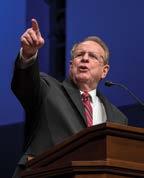
in the areas of prayer and spiritual awakenings, Elliff has written over a dozen books, including A Passion for Prayer, Come Home to the Heart of God, and What Should I Say to My Friend? Elliff and his wife, Dianne, whom he married on the campus of Southwestern Seminary in 2016, live in Oklahoma.
Smith directed the field personnel orientation for the IMB for 15 years following 13 years of missionary service alongside his wife, Kay, in Latin America and South Asia. Smith also pastored churches in the United States for 13 years. His most recent ministry assignment included serving as an international trainer in the United Kingdom. Smith has written Church Planting By the Book and The Church in Acts: A Framework for Studying the New Testament Foundation for Church.—A. A.
Southwestern News 60
AROUND THE WORLD
ALUMNI UPDATES
1980
Charles Edward Williams (MACM 1984) to Taylor Road Baptist Church in Montgomery, AL as Senior Adults Minister.
Michael Ray Wood (MARE 1989) to Calder Woods Senior Living Community in Beaumont, TX as Chaplain to Residents.
1990
Gregory Alan Kinch to Whispering Pines Baptist Church in Sebring, FL as Pastor.
Edwin Ray Walker (MARE 1990) to Mount Lebanon Baptist Encampment in Cedar Hill, TX as Director.
Roger Andrew Taylor (MDIVBL 1996) to Baptist General Convention of Oklahoma in Oklahoma City as Regional Ministry Partner.
2000
Jake Waters Duke (MDIV 2002) to Hale Baptist Association in Moundville, AL as Associational Mission Strategist.
Andy Kyle Bunn (MDIV 2004) to CEF Military Children’s Ministry in Warrenton, MO as Director.
Jeremy Paul Roberts (MDIV 2007) to Farmington First Baptist Church in Farmington, AR as Senior Pastor.
2010
Katherine Claire Frugé (MDIV 2010; PhD 2019) to Baptist General Convention of Texas in Dallas, TX as Director of the Center for Cultural Engagement and the Christian Life Commission.
2020
Julio Arriola (MTS 2020) to Send Network SBTC as Director.
RETIREMENT
1970
Walter Dean Finch (MARE 1971) retired with Diane, living in Montgomery, AL.
1980
Gary Kirk Ledbetter (MDIV 1981) retired with Tammi, living in Prairie Grove, AR.
Randall Ross Robinson (MARE 1982) retired with Brenda, living in Birmingham, AL.
Duane Russell Duck (MDIV 1984, DMIN 1989) retired with Jone, living in Elk City, OK.
Randall Craig Fowler (MM 1985) retired with Carole, living in Tuscaloosa, AL.
ANNIVERSARIES
1970
Donald Royce Thrasher (MRE 1974) and Sarah (Northcutt) Thrasher, 50th wedding anniversary (December 1970).
MEMORIALS
1940
John W. “Jack” MacGorman (BDIV 1948; ThD 1956)
1950
Dale David Perkins, Sr. Edmond Marvin Knox
Virginia Lee Shearin (BSM 1951)
Mary Sue Lockard (BRE 1952)
Robert O. Feather (MRE 1953)
Robert Lee Lamb (MRE 1955, EdD 1964)
Harold Cleveland Proctor (BDIV 1955)
Margaret Joyce Wolf (MRE 1955)
Presnall Hansel Wood (BDIV 1956)
Beverly Jane Ball (MARE 1957)
Joyce G. Jones (MSM 1957)
Lucian Rudd, Jr. (BDIV 1957; MARE 1963)
Lemuel Edgar Whitlock (BDIV 1957)
Cammid Olevia Arrendell (BDIV 1958)
Hardy Smith Clemons (BDIV 1959; ThD 1966)
William Leonard Carlton Richardson (BDIV 1959; ThD 1964)
1960
James Leo Golden
Kara Hammer
Mary Elizabeth Love
Joe L. Provence
Ray Nolan Tharp
Donald Wade Chaffin (BDIV 1961; MDIV 1973)
Leslie Monroe LeFils (BDIV 1961)
Charley Leeroy Lewis (BDIV 1961)
Paul Wayne Stripling (BDIV 1961; ThM 1965; ThD 1967)
William Sheppeard Glass (BDIV 1963)
Otis Lavay McCullough (BDIV 1963)
Harold Hughes Hendrick (BDIV 1964)
William Randall Lolley (ThD 1964)
Robert Glenn Campbell (BDIV 1965)
Kenneth Homa Mercer (MARE 1965)
Donald Ray McGough (DipTh 1966)
Robert Allan Poage (BDIV 1967)
William Blaylock Sutton (BDIV 1967)
Kenneth Wayne Greene (MARE 1969)
Lowell Dean Skaggs (MDIV 1969) 1970
Sara Lou Cargill
Cynthia Williams Carter
Richard Brady Blair (DipTh 1972; Gr DipRE 1990)
Rodney Ray Irby (MDIV 1973)
James Donald Dendy (Dip Th 1976)
Herman Jerry Harris (MACM 1976)
1980
Cindy Bryant
Glenn Alan Langner (MDIV 1983)
James Lee Branum (MM 1989)
1990
Jeffrey Lynn English (MDIV 1998)
We love to hear from Southwesterners from all over the world. If you have recently changed your ministry positions or celebrated a retirement, anniversary, or birth, we would love to hear about it. Please contact us at:
SPRING 2022 61
Phone (toll free) 1.877.GO.SWBTS (1.877.467.9287) Phone (local) 817.921.8830 Email alumni@swbts.edu Mailing Address PO Box 22500 Fort Worth, TX 76122-0500
Address 2001 W. Seminary Drive Fort Worth, TX 76115 KEEP IN TOUCH
Physical
Making an investment around the world
The Southwestern story of Charles Wolcott
BY ASHLEY ALLEN
TO LISTEN TO 87-YEAR-OLD RETIRED LT. COL. CHARLES WOLCOTT (’64) speak of his life and ministry experiences is to listen to a man filled with joy and gratitude.
When the Refugio, Texas, native graduated with Bachelor of Arts degrees in English, history, and religion from Baylor University in 1957, the new father moved his first wife, Norma, and their two-month-old daughter to the Dallas-area to begin serving at the then-Annuity Board of the Southern Baptist Convention.
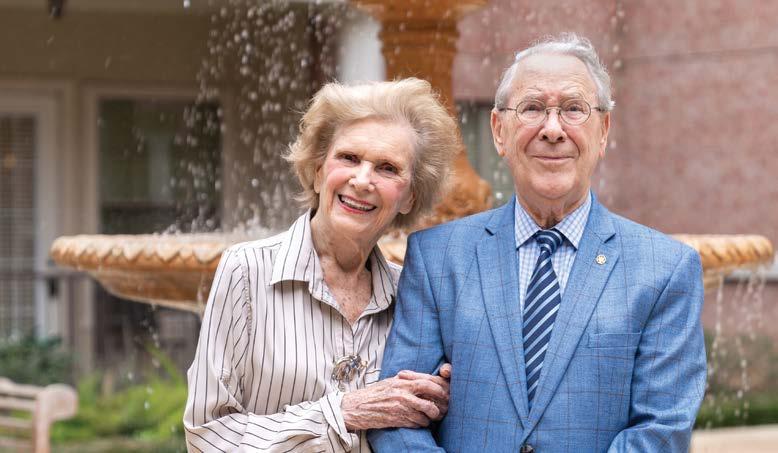
Sensing a call to ministry, he was encouraged to enroll at Southwestern Seminary by W. A. Criswell, legendary pastor of First Bap-
tist Church of Dallas. Upon graduation with a Master of Divinity in 1964, he began to pastor in Dallas. However, with the United States in the middle of the Vietnam War and inspired by a former professor at Baylor who served as an Army chaplain in World War II and “loved the chaplaincy,” Wolcott sensed “the Lord was leading” him to enlist as a chaplain in the U.S. Army. In 1966, he was endorsed by the thenHome Mission Board, now the North American Mission Board, to serve as a chaplain in the Army and was initially stationed at Fort Hood, Texas.
For the next 22 years, military chaplaincy assignments took Wolcott around the world
Southwestern News 62WHY I GIVE
caring for soldiers and their families in Vietnam, San Francisco, Germany, North Dakota, Wisconsin, Walter Reed Medical Center in Bethesda, Maryland, and ultimately at the Pentagon in Arlington, Virginia, before his final assignment at Fort Hood, where he retired from the military in 1988.
In his unique role as the chaplain at the Pentagon, for three-and-a-half years Wolcott was the lone chaplain to the 25,000 people who worked in the nation’s military headquarters. Through this ministry role, he oversaw the 22 weekly Bible studies offered on-site and was responsible for the former Pentagon Pulpit Program. Additionally, once a month he relieved the chaplain on duty at Arlington
National Cemetery, which is located adjacent to the Pentagon.
Wolcott’s service in the Army earned him numerous commendations, including three Bronze Stars, five Meritorious Service medals, four Army Commendation Medals, the Vietnamese Cross of Gallantry with palm, Vietnamese Honor Medal First Class, and an award as the honor graduate of the 4th U.S. Army Language School, among other awards.
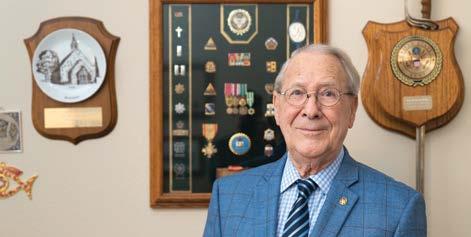
Though Wolcott retired from the military as a U.S. Army chaplain in 1988, he did not retire from ministry. Following his military service, he began teaching psychology courses at Central Texas College while serving as the senior pastor of Sunset Baptist Church in Killeen, Texas, for well over a decade. Later, following the encouragement of their youngest daughter, the Wolcotts moved to Houston to be closer to their family. In Houston, Norma was diagnosed with cancer and Alzheimer’s and Wolcott cared for her as her primary caregiver. After her passing, he married Pauline in 2010.
Wolcott has been a faithful giver to Southwestern Seminary for almost five decades. Some of his investment in Seminary Hill includes the building of Mathena Hall, which
houses the Roy J. Fish School of Evangelism and Missions and Texas Baptist College.

Seeking to plan ahead, Wolcott recently established a charitable gift annuity through a program of the Southern Baptist Foundation. The annuity provides for Pauline after Wolcott’s passing while also giving to the seminary.
“I want to support the seminary,” Wolcott explains while commending the “great job” the seminary is doing in the work of training men and women for theological education. “The Lord has blessed me with more money than I ever thought I would have, so I felt this is what I would rather do before I die then leave it; that’s what the Lord led me to do.”
As Wolcott invests in the next generation of God-called men and women, he says the institution’s commitment to the Great Commission encourages him to give.
“Our mission is to ‘go,’” Wolcott notes. “Southwestern is true to the Great Commission – sending people out to preach the Gospel, the Good News, so it is why I support Southwestern. I believe they have done, and are doing, a good job.”
SPRING 2022 63 WHY I GIVE
Charles Wolcott (’64) has faithfully given to Southwestern Seminary for over five decades.
“Southwestern is true to the Great Commission – sending people out to preach the Gospel, the Good News, so it is why I support Southwestern.”
– CHARLES WOLCOTT ( ’64)
BY F.
THIS IS A GREAT TIME of year on Seminary Hill. As this issue of Southwestern News goes to press, the grass is green, the trees are full, and the flowers are blooming. Students are finishing their last few assignments to complete another semester, and a new crop of graduates is getting ready to walk across the stage in MacGorman Chapel to be sent out into the world to carry the message of the Gospel to the ends of the earth. My heart is full when I think of what these students will accomplish for the Kingdom and that Southwestern Seminary got to play a small part in training them up and sending them out.
The joy I feel when I look at these new Southwesterners stands in stark contrast to what I see oftentimes when I look out on the landscape of Christianity today, especially at times among some of our fellow Southern Baptists. We will gather soon in Anaheim, Calif., for our annual meeting, where we will conduct business, deliberate together, elect officers, and celebrate all God has done through our convention of churches over the last year. Unfortunately, there are some who can’t—or maybe just won’t—see all the good. They will only choose to focus on what they perceive as the bad. We will hear, “We are too conservative,” or “The whole SBC is just a ‘woke’ cesspool,” or “I can’t believe we voted for that guy,” or “I can’t believe what our leaders have done.” It will go on and on.
and leaders are dealing with in our churches today. All too often we hear of folks who say, “I just don’t like our pastor,” or “I just wish he would preach better,” or “I wish we would sing newer music (or older music).”
There is a better way.
In Ephesians 4:3, Paul urges followers of Christ to “maintain the unity of the Spirit in the bond of peace.” The word “unity” in this
Sadly, the attitude that seems to permeate some messsengers in our annual meeting is just an illustration of what so many pastors
passage is a noun—meaning as believers, unity is not something we are to do (that word is “unite”) but is instead supposed to be who we are. Think about that for a moment. This isn’t something we are seeing a lot of right now. Believers, through the power of the Holy Spirit, are supposed to BE unity, or another way to put it is that we should BE one. How are we doing at being in unity with each other? I propose that we be marked by the love we show each other, by giving each other the benefit of the doubt, and by assuming the best of our fellow Christians instead of immediately assuming the worst. At the end of the day, there really shouldn’t be that many things that cause us to want to move away from the exhortation of Paul in Ephesians 4 to be in unity with each other.
We have so much to celebrate as Southern Baptists, and especially as Southwesterners! God continues to bless the work on Seminary Hill. I pray we can all focus on the good and work to bring the message of Christ to the ends of the earth—that Southern Baptists will show the way in being one for the sake of the Gospel.
To support Southwestern Seminary and help us impact the world for Christ, visit swbts.edu/give.
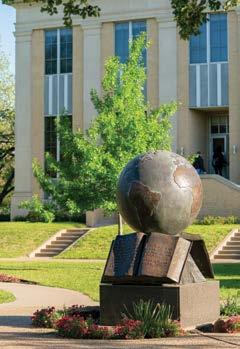 F. EDWARD UPTON is vice president
F. EDWARD UPTON is vice president
for
institutional advancemet at Southwestern Seminary.
Southwestern News 64
LAST WORD
Let us 'maintain the unity of the Spirit in the bond of peace'
EDWARD UPTON
Your giving and the life of the Southern Baptist Convention.
I propose that we be marked by the love we show each other, by giving each other the benefit of the doubt, and by assuming the best of our fellow Christians instead of immediately assuming the worst.
We have so much to celebrate as Southern Baptists, and especially as Southwesterners!
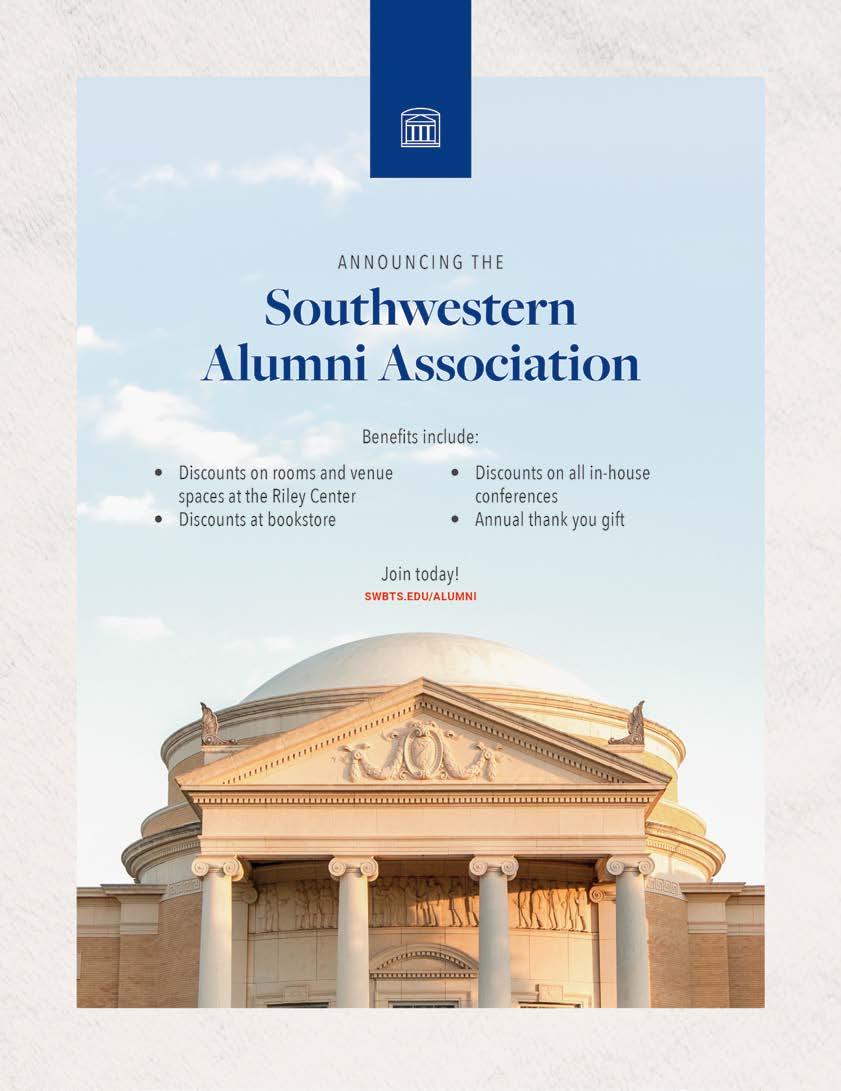
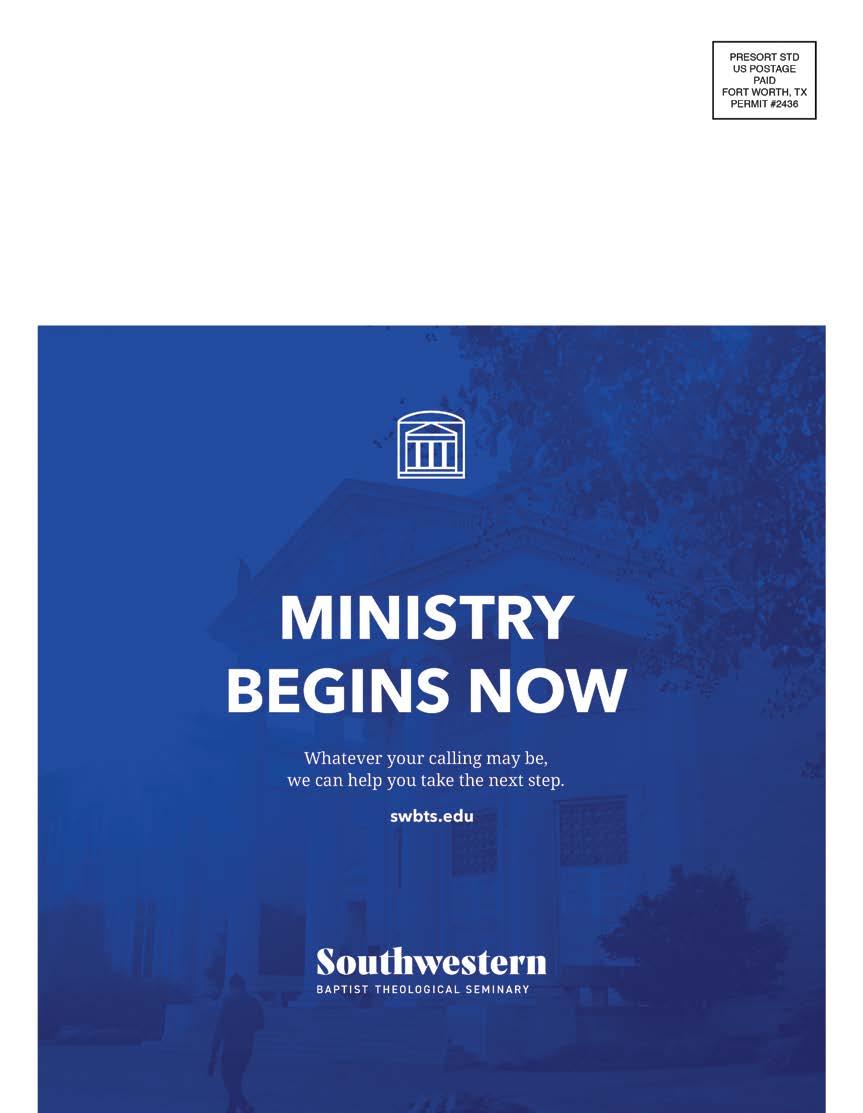





 BY ASHLEY ALLEN AND CLARA MOLINA
BY ASHLEY ALLEN AND CLARA MOLINA
















































 BY ASHLEY ALLEN AND CLARA MOLINA
BY ASHLEY ALLEN AND CLARA MOLINA













 BY TOBIN PERRY
BY TOBIN PERRY






































 F. EDWARD UPTON is vice president
F. EDWARD UPTON is vice president

